When you buy through our links, we may earn a commission. Products or services may be offered by an affiliated entity. Learn more.
Best Mattress for Heavy People in 2026
Expert Tested and Approved
If you weigh 230 pounds or more, you’ve probably noticed that not every mattress is built with your sleep needs in mind. That’s why I put together this guide. My weight falls slightly below 230 pounds, but I share many of the same considerations when it comes to finding the right mattress, including the need for solid support, a surface that’s easy to move on, and materials that won’t hug me too closely and trap body heat.
I’ve also spent the past several years testing mattresses with a team of people representing a wide range of body types and sleep styles, and one thing I’ve learned is that finding the right bed is less about labels like “average weight” or “plus-size” and more about understanding how your body interacts with different materials, firmness levels, and support systems.
Below, I’ll share what I’ve learned about which mattresses tend to work best for heavier people, based on both data from our Test Lab and real-world feedback.
Our Top Pick: Titan Plus Luxe
We chose the Titan Plus Luxe as the best mattress for heavy people, because it combines deep foam cushioning with strong coil support to prevent excessive sinkage, particularly around the midsection. Our testers over 230 pounds reported excellent spinal alignment, stable edges, and cool sleep throughout the night, making it a durable and comfortable choice for bigger bodies.
Our Top Picks
Best Overall
:Titan Plus Luxe
Shop Now
Most Comfortable Mattress
:Helix Plus
Shop Now
Best Value Mattress
:DreamCloud Classic Hybrid
Shop Now
Best Mattress for Back Pain
:WinkBed Plus
Shop Now
Best Mattress for Couples
:Leesa Plus Hybrid Mattress
Shop Now
Best Mattress for Side Sleepers
:Nolah Evolution Comfort+
Shop Now
Best Mattress for Hot Sleepers
:Brooklyn Bedding Aurora Luxe
Shop Now
Best Mattress for Hip Pain
:Bear Elite Hybrid
Shop Now
Best Mattress for Spinal Alignment
:Endy Hybrid
Shop Now
Best Luxury Mattress
:Saatva HD
Shop Now
Best Extra-Firm Mattress
:Titan Plus Core
Shop Now
Best Mattress Deals for Presidents’ Day
- Save $437 — Titan Plus Luxe
$1,312(List Price $1,749) - Save $299 — Helix Plus
$1,199(List Price $1,498) - Save $1,243 — DreamCloud Classic Hybrid
$649(List Price $1,892) - Save $857 — WinkBed Plus
$1,999(List Price $2,856) - Save $413 — Leesa Plus Hybrid Mattress
$1,236(List Price $1,649)
How We Tested the Best Mattress for Heavy People
Testing Criteria for Heavy People
While our ratings for each mattress are based on our general testing methodology, we looked at the following factors more closely to compile this list:
Support & Spinal Alignment: The most important thing for a heavy sleeper is that their midsection is properly supported and that their spine is aligned. A lot of things play into this, including material, firmness, mattress “zoning”, and the sleeping position of the sleeper.
Firmness: By and large, heavier people require a firmer mattress in order to give them the support they need.
Ease of Movement: A big concern for heavier sleepers can be ease of movement. Certain materials that conform close to the body, such as memory foam, and make moving around the bed difficult.
Edge Support: The better the edges are supported, the more usable space there is on the mattress. Those with larger bodies can benefit from this extra space, and those with mobility issues can benefit from a sturdy edge that makes entering and leaving the mattress easier.
How We Evaluated
Within our a database of 1000+ mattresses, we looked for the following parameters:
- Either designed for heavy sleepers, or a firmness level of 6 or higher
- An overall rating of at least 8.4
- Above average Ease of Movement and Edge Support Ratings
From this we found 26 models from trusted brands, and took this into our Test Lab to perform weight testing. As someone just slightly below 230 pounds, I was the main tester, and for edge support and movement tests we added weights to simulate heavier sleepers.
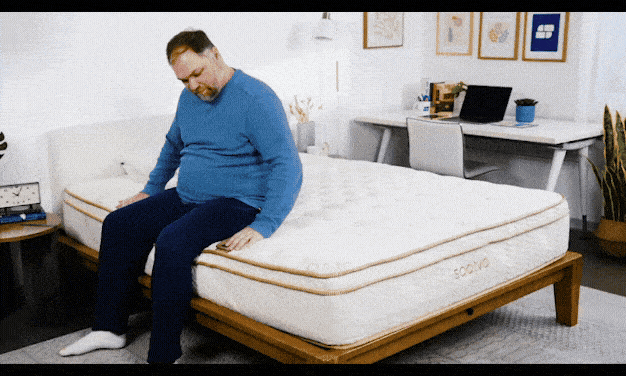
After performing further mattress sagging, spinal alignment, edge support, and ease of movement, we came to the 10 models you see on this list now. We then gave them each accolades to highlight their unique strengths.
Our Testing Team

Logan Foley
Editorial Director
Full Bio

Mary Fenton
Head of Product Content
Full Bio

Jeremy Klein
Senior Product Testing Manager
Full Bio

Brad Nehring
Senior Product Analyst
Full Bio

Colin Simpson
Product Research Manager
Full Bio
Best Mattresses for Heavy Sleepers
Best Overall
8.4/10Test Lab ScoreTitan Plus Luxe
Ultra-firm support and cooling properties meet a plush Euro-top surface.
Key Details
- Who It’s Best For: Side sleepers over 230 pounds and back and stomach sleepers between 130 and 230 pounds.
- Feel: Cushy on the surface, supportive, and springy.
- What It’s Made Of: Gel-infused memory foam and responsive polyfoam layers over pocketed coils.
- What We Don’t Like: Potentially not enough support for stomach sleepers over 230 pounds, plus an extra fee for the cooling cover.
Scoring & Reviews
The following ratings show how suitable this mattress is for different sleeping positions and sleeper weights. These scores are determined by how well the mattress supports and relieves pressure for each sleeper type.
In addition to the hands-on feedback from our team, we conduct a number of quantitative tests in our Test Lab. The below ratings are based on the experience of our testers.
SELECT AN ICON TO VIEW DETAILS:
Motion Isolation
Consistent with other hybrids, motion isolation is neither a major weakness nor a chief strength of the Plus Luxe. The memory foam in the Titan Plus Luxe absorbs some movement, but the supporting foam and pocketed coils produce bounce and motion transfer.You might feel light vibrations when your bed partner changes positions or gets in and out of bed. But for most people, this won’t cause significant sleep disruptions and will only be a problem for those who are easily awakened.
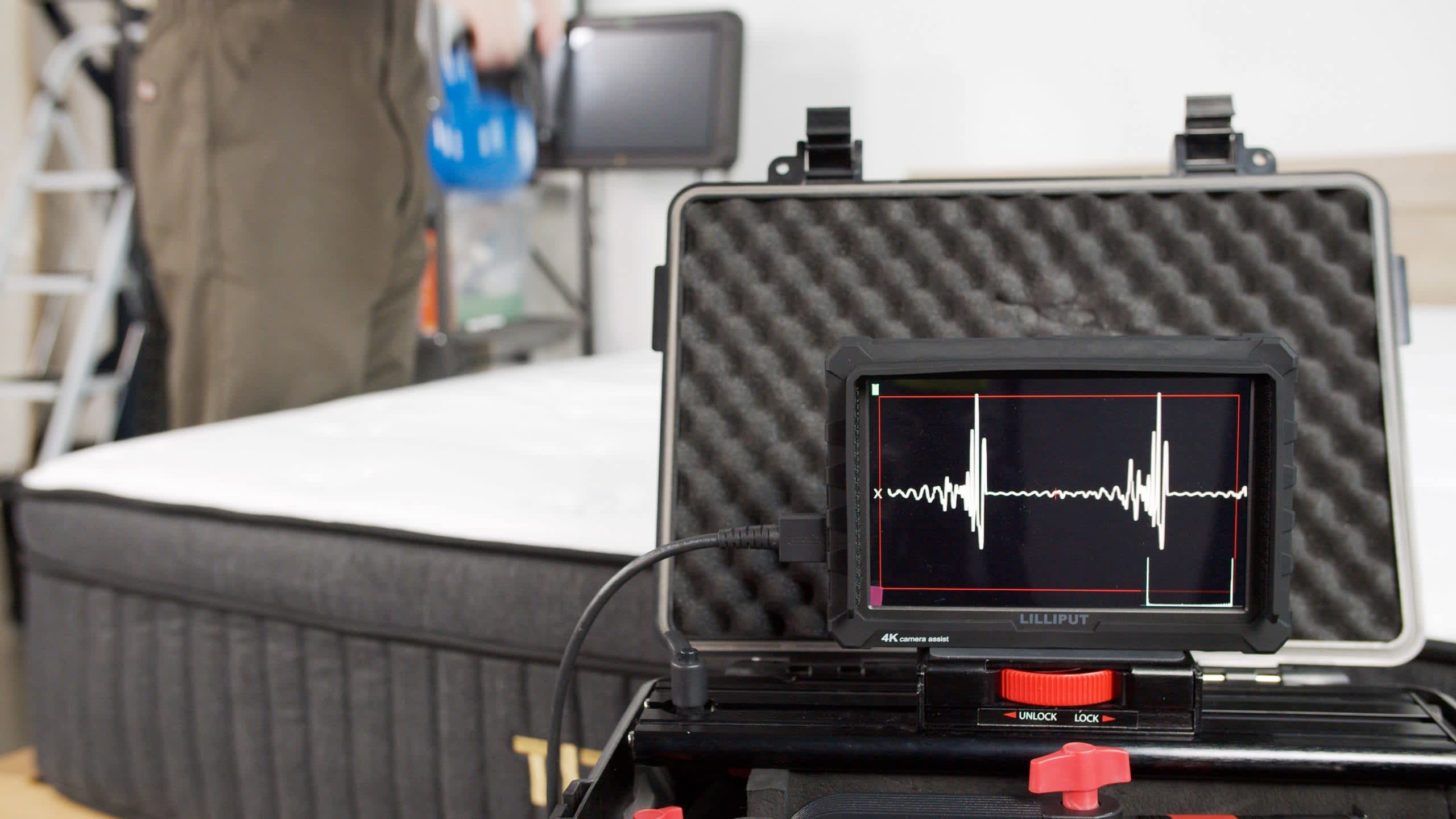
Pressure Relief
The foams in the Plus Luxe’s cover and comfort layer provide even contouring and weight distribution, taking pressure off the shoulders, lower back, and hips, and alleviating discomfort in these potentially sensitive areas.However, not all sleepers will get the same level of pressure relief. We found that some side sleepers under 130 pounds may find it too firm, while some back and stomach sleepers over 230 pounds may sink too deeply into the mattress.
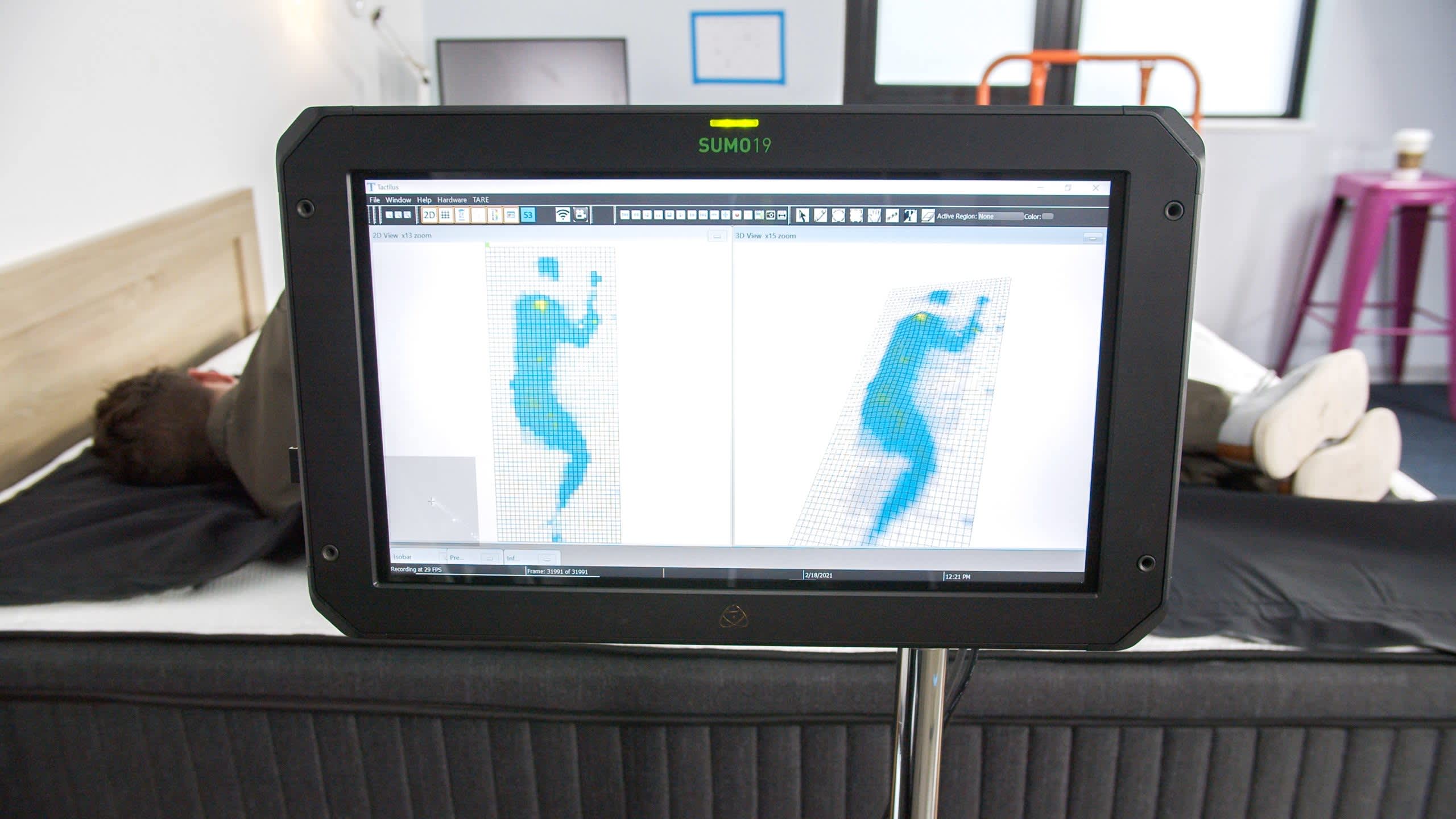
Temperature Control
The Titan Plus Luxe’s memory foam can retain heat, as it closely hugs the body. At the same time, the open coil system promotes steady air circulation.Though it costs extra, the cooling cover can be an asset for hot sleepers. Phase change material is engineered to absorb and dissipate body heat so that the surface maintains a neutral temperature. That said, the standard cover sleeps reasonably cool and is likely sufficient for people who don’t tend to overheat.
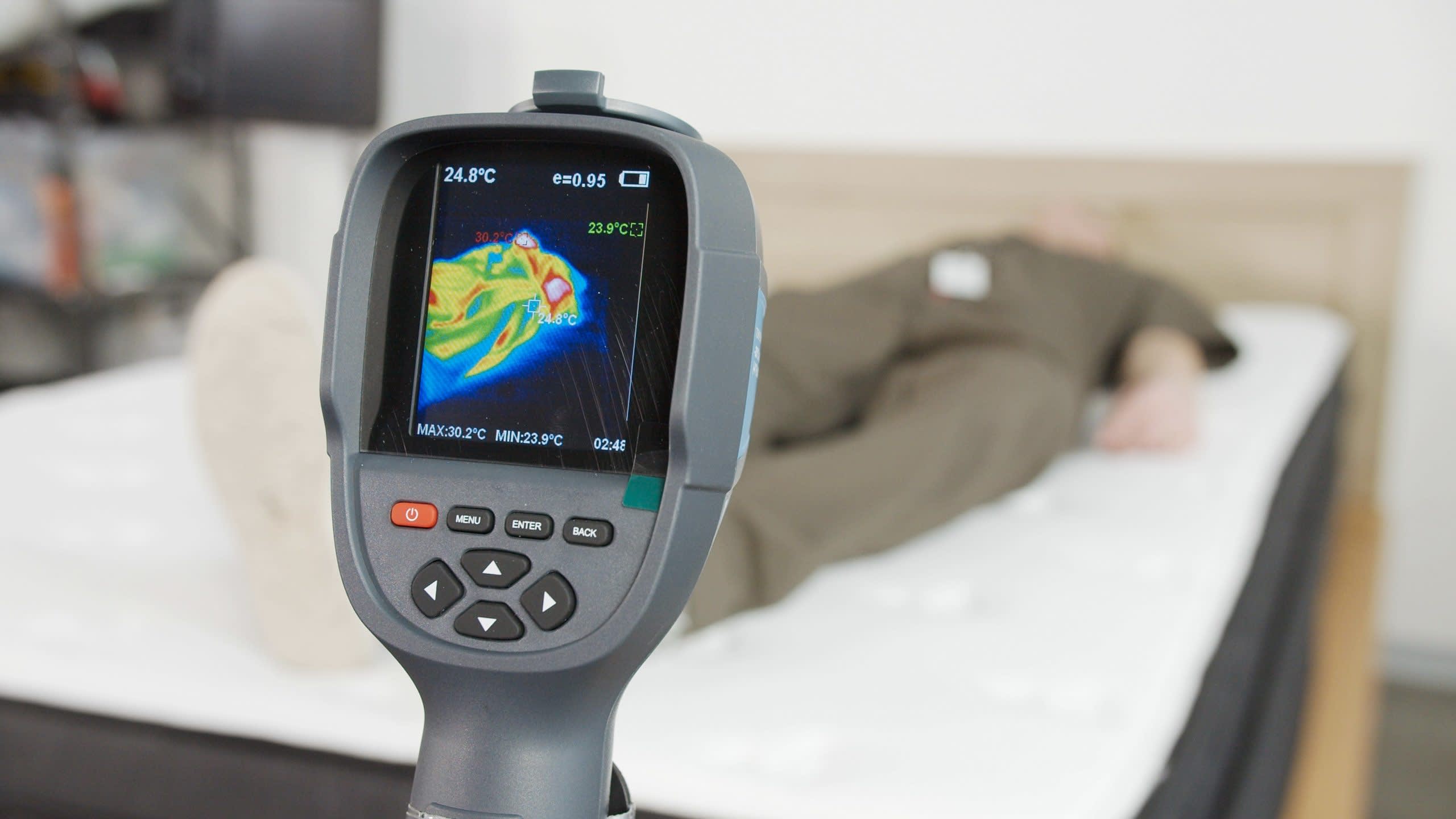
Edge Support
The Titan Plus Luxe offers reliable edge support, which is a characteristic of many hybrid mattresses. The bed’s 8-inch pocketed coils are thick, and added reinforcement around the perimeter reduces sinkage when you sleep or sit along the edges.Our testers did detect some extra compression of the memory foam around the perimeter, but they didn’t find it to be a problem for overall edge-to-edge stability.
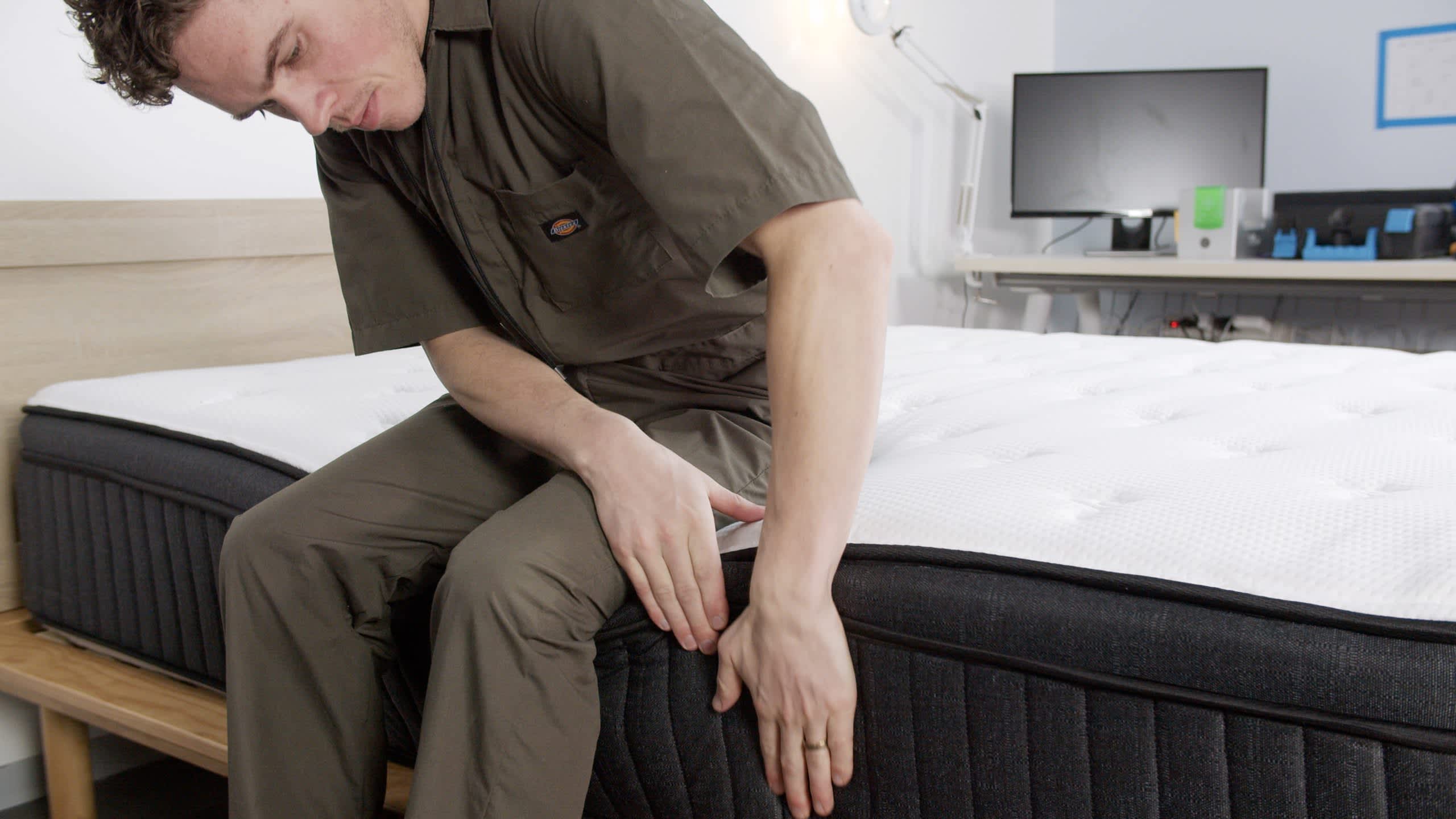
Ease of Movement
Our testing team felt that it was generally easy to move on the surface of the Plus Luxe. As memory foam conforms to the body, it can pose an initial barrier to movement. But that is counteracted by the coils and polyfoam, both of which add a springy feel to the mattress.Some people who weigh more than 230 pounds may sink in more deeply and inhibit movement more.
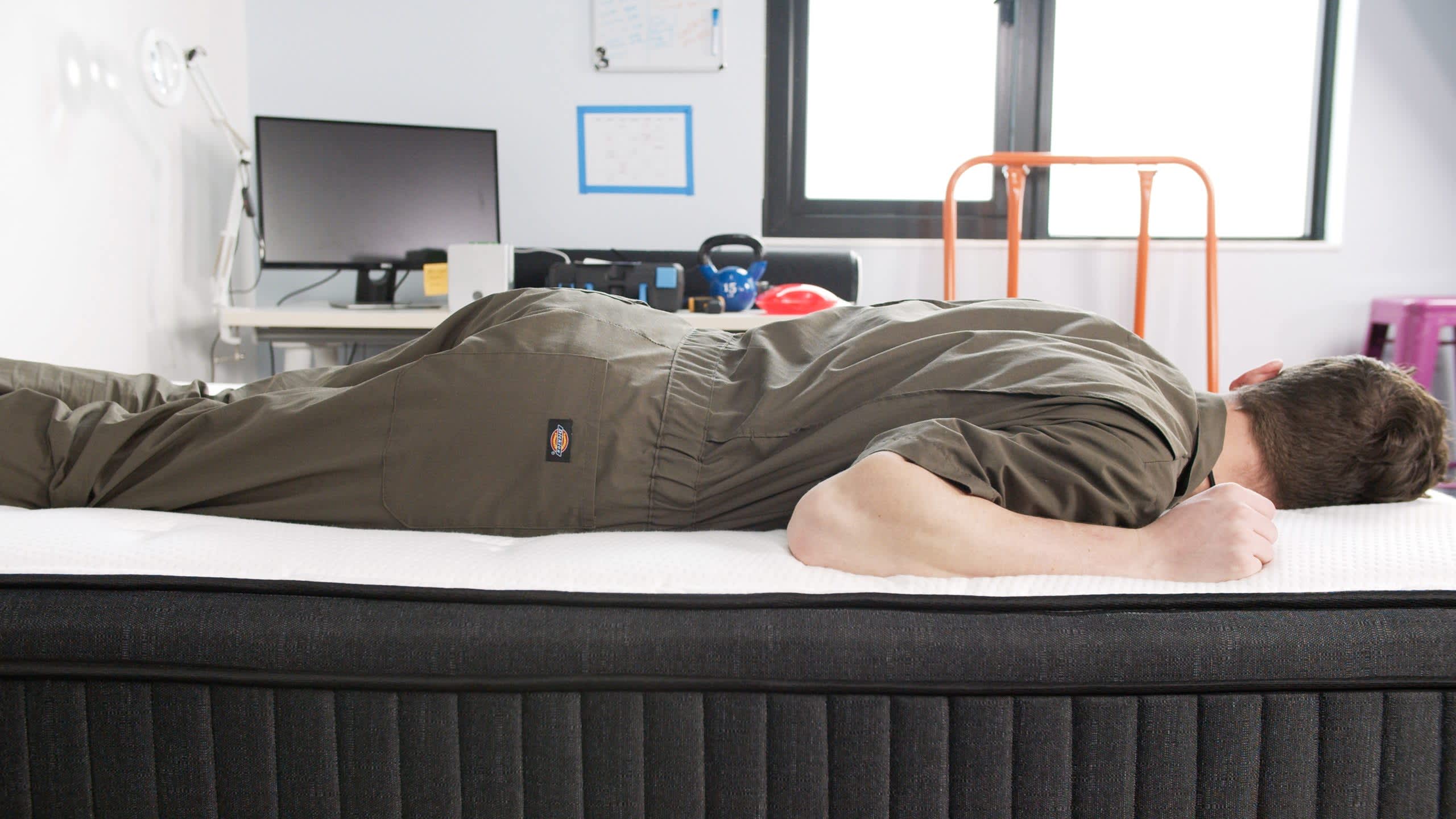
Durability
With its foam comfort layers, the Titan Plus Lux should last a bit longer than other hybrid beds, likely around eight years. While polyfoam and memory foam are prone to softening and sagging over time, the comfort layer here is on the thicker side, which should help it resist early deterioration. As with other hybrid models, the coil support core will likely hold up well, though the polyfoam transition layer could soften toward the end of the mattress’ lifespan.
Full Breakdown
The Titan Plus Luxe from Brooklyn Bedding strikes a nice balance between surface-level contouring and overall stability. Multiple foam layers cushion your body, evenly distribute your weight, and reduce pressure along the spine, but we noticed excellent support and minimal sinkage during our hands-on mattress tests.
How It Performed
Our side sleepers weighing more than 230 pounds awarded the Plus Luxe excellent ratings. The medium firm (6) feel and deep foam layers provided ample cushioning for the hips and shoulders but none of us reported excessive sinkage. Our back sleepers in this weight range also felt adequately supported.
We found cooling to be one of the Plus Luxe’s biggest strengths. Thanks to the breathable foam layers and steady airflow through the coil layer, we noticed little heat buildup when our team tested the mattress for temperature control.
That said, people who sleep exceptionally hot should consider the cooling cover upgrade. The coils were also sturdy and responsive enough to earn the Plus Luxe high marks during our edge support and ease of movement tests.
Construction Breakdown
The Plus Luxe features a Euro-top cushioned with memory foam quilted into the cover for a bit of plushness on the surface. The comfort layer of proprietary TitanFlex foam is designed to mimic the responsiveness of latex, so you’ll notice a gentle bounce when getting into bed. A polyfoam transitional layer serves as a buffer between your body and the support core while providing additional cushioning.
Pocketed coils over high-density base foam provide excellent overall stability for the mattress, reinforcing the springy feel without generating too much motion transfer. A polyester cover encases the mattress. For an added fee, you can upgrade to a cover made of GlacioTex infused with phase change material. This fabric dissipates heat on contact to help maintain a cool sleep surface at all times.
Most Comfortable Mattress
9.0/10Test Lab ScoreHelix Plus
Dense foam layers and zoned coils provide support and cushioning.
Key Details
- Who It’s Best For: Side and back sleepers over 230 pounds.
- Feel: Firm and responsive with light contouring for the shoulders and hips.
- What It’s Made Of: Two comfort layers of dense polyfoam over pocketed coils with a reinforced perimeter.
- What We Don’t Like: Not ideal for hot sleepers, who may need the cooling cover upgrade.
Scoring & Reviews
The following ratings show how suitable this mattress is for different sleeping positions and sleeper weights. These scores are determined by how well the mattress supports and relieves pressure for each sleeper type.
In addition to the hands-on feedback from our team, we conduct a number of quantitative tests in our Test Lab. The below ratings are based on the experience of our testers.
SELECT AN ICON TO VIEW DETAILS:
Motion Isolation
As the firmest model in the base Helix lineup, the Helix Plus predictably didn’t test quite as well as their other models, but that doesn’t mean it tested poorly. It’s foam comfort layers are still fairly thick, and our testers noticed only a little movement across the bed.
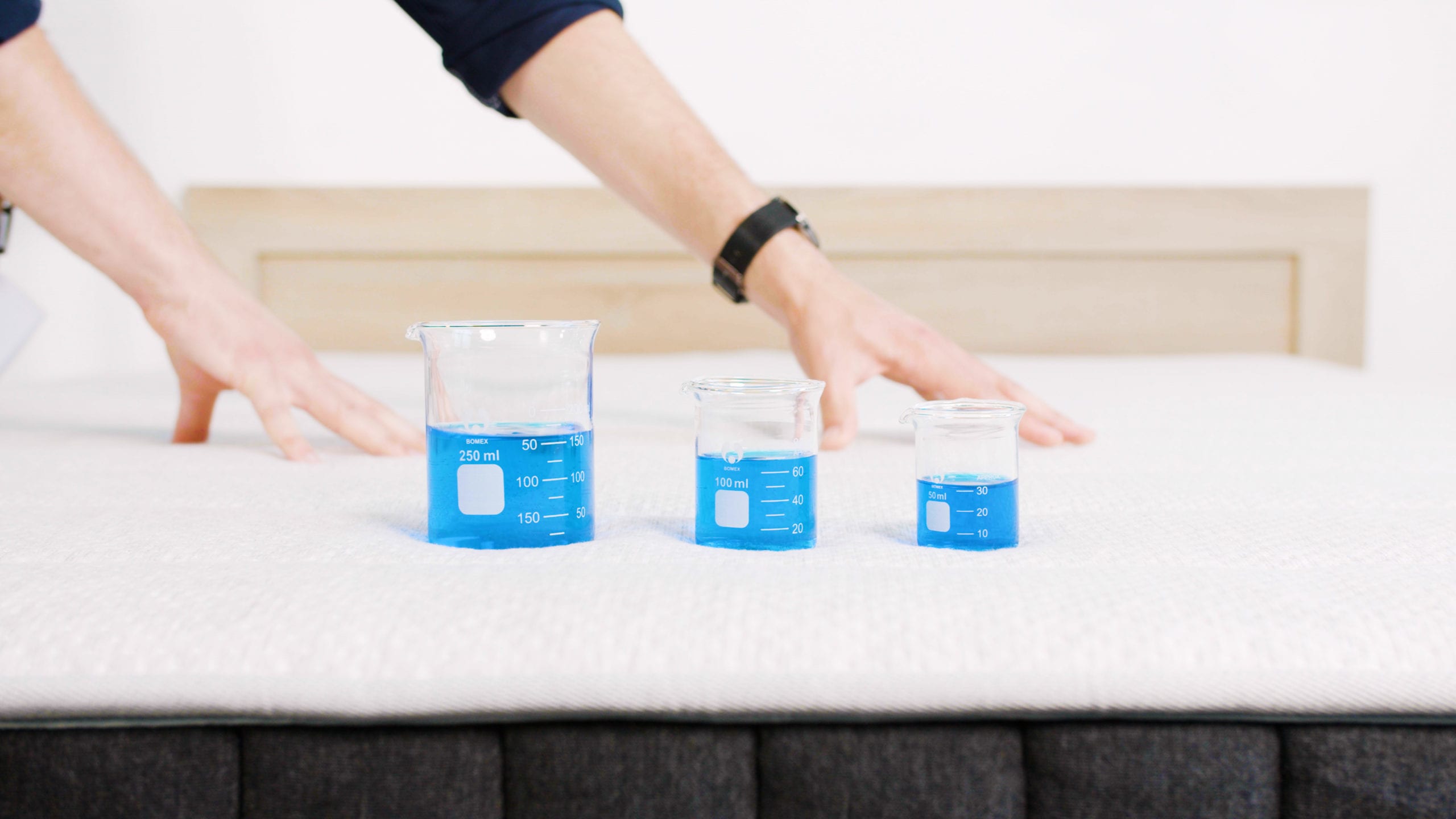
Pressure Relief
All of the Helix base models have somewhat thick foam comfort layers and conform fairly close to the body. Consequently, they’ve all performed fairly well in our pressure mapping tests, with notably less pressure in the hips and shoulders than many hybrids. The Plis in particular relieves pressure a little worse than other Helix beds, as it’s a firmer model.
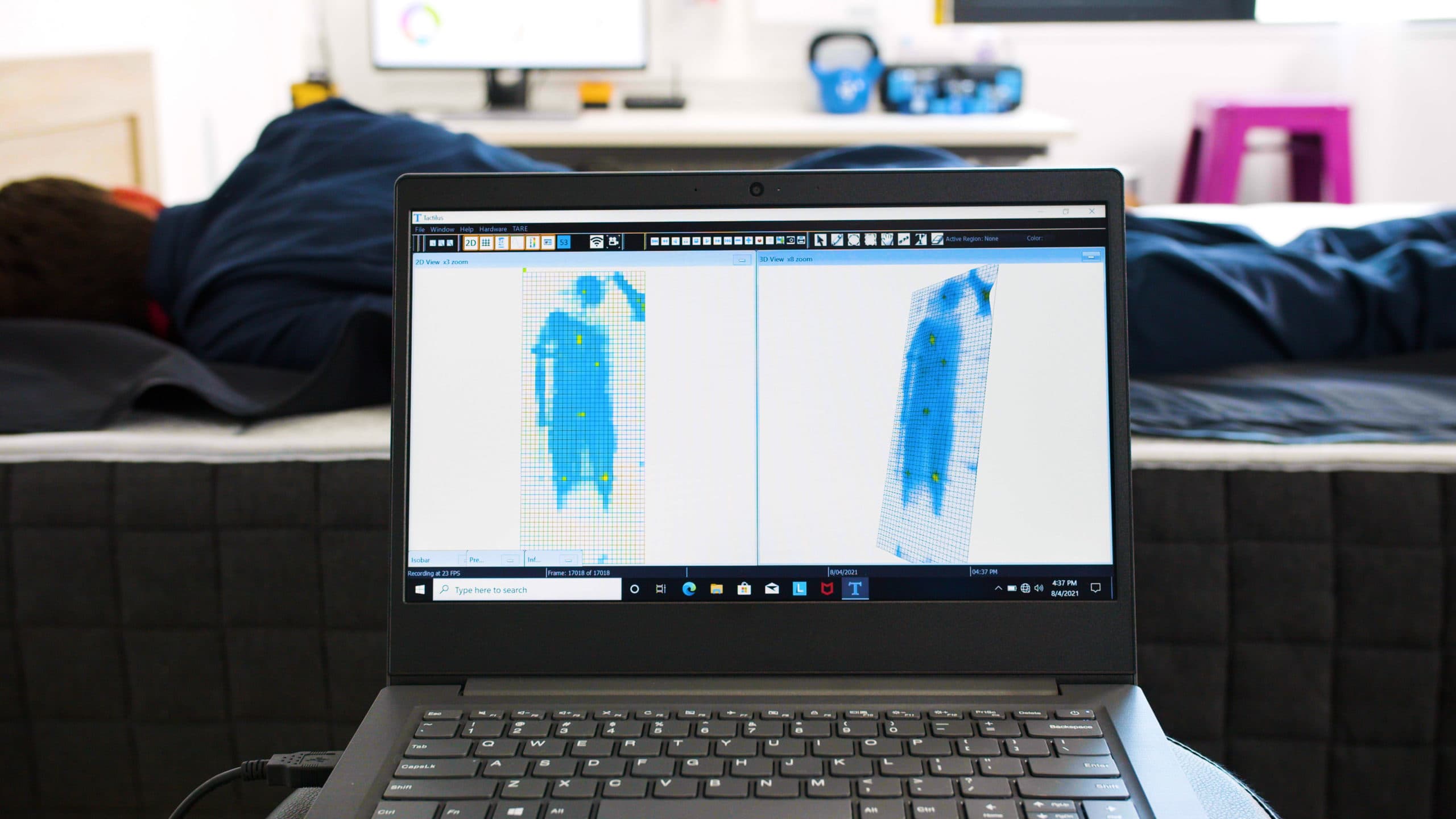
Temperature Control
The Helix mattresses perform about average for hybrids when it comes to sleeping cool. Memory foam is well-known for its tendency to sleep hot, as it often traps and retains heat through the night, but the coil cores of these beds promote airflow to help balance out heat retention.
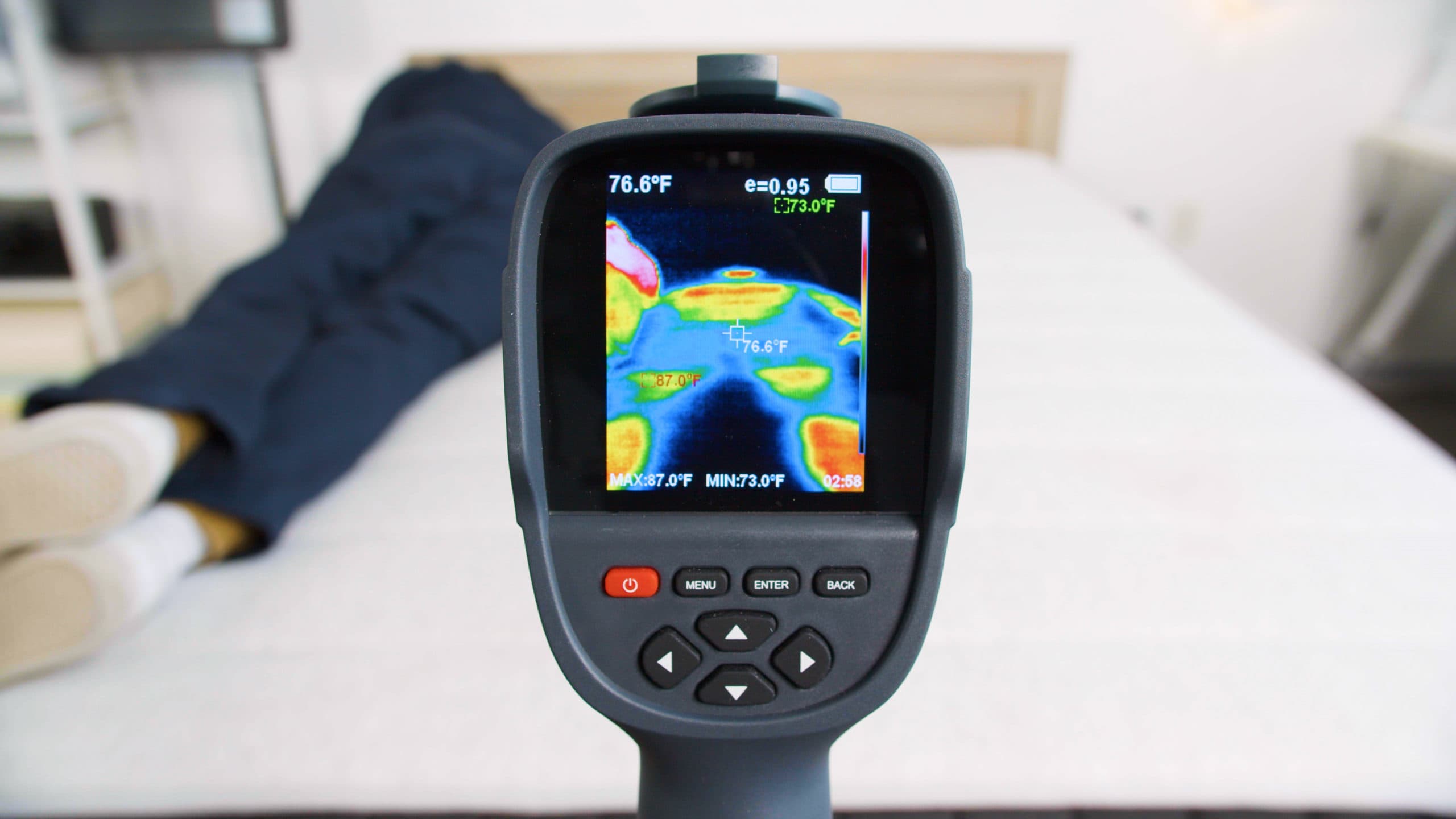
Edge Support
All Helix mattresses feature a reinforced perimeter, meaning the coils on the edges are thicker than the coils in the middle of the bed. When putting this to the test, we found significantly less sinkage on the edge than the middle while applying weight. As a firmer model in the Helix lineup, the Plus provides better support than other Helix beds.
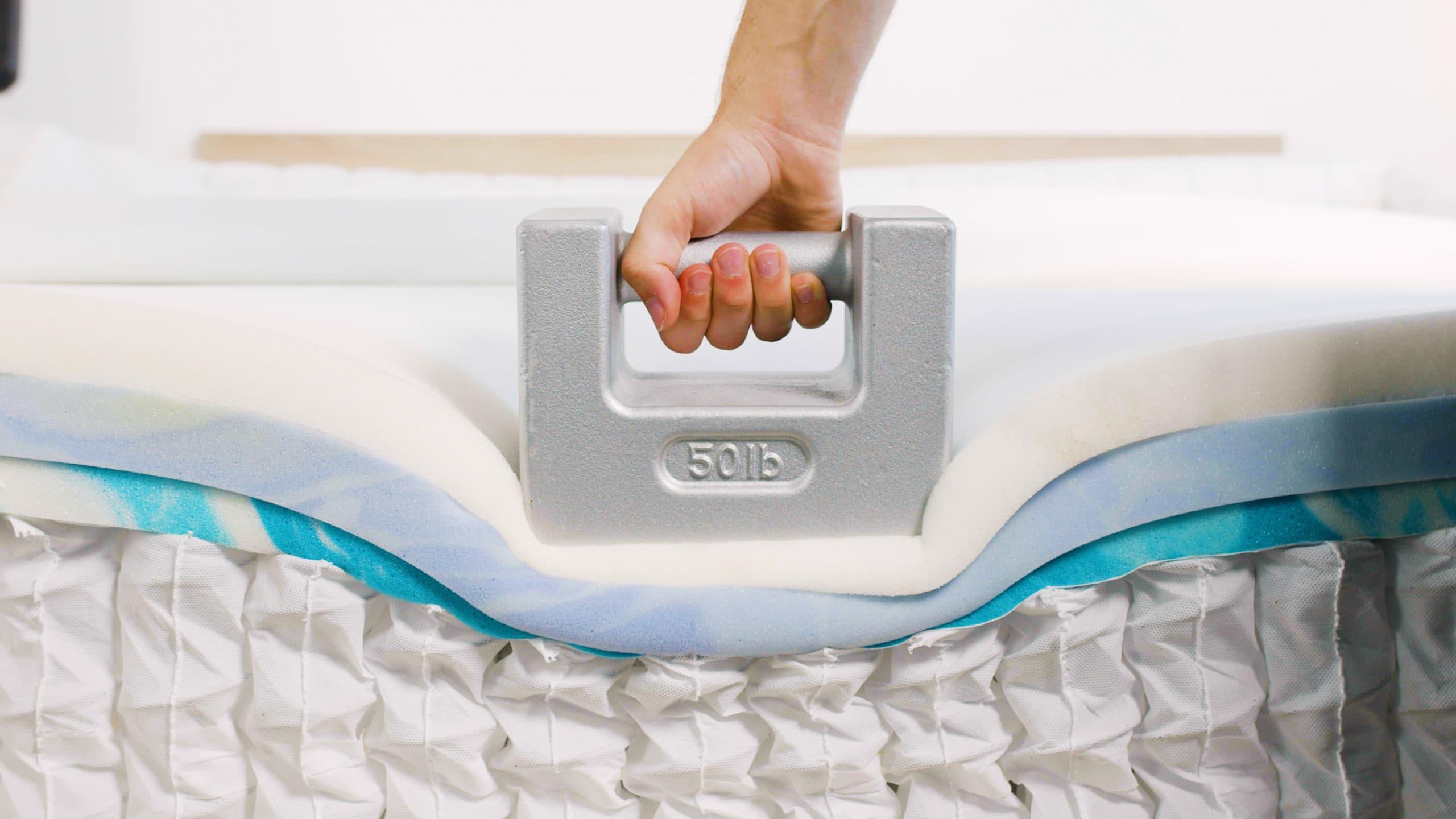
Ease of Movement
Helix mattresses tend to be fairly responsive and bouncy, and all tested well for ease of movement. The Plus in particular tested very well, as the firmer layers prevent sinkage and make for effortless movement.
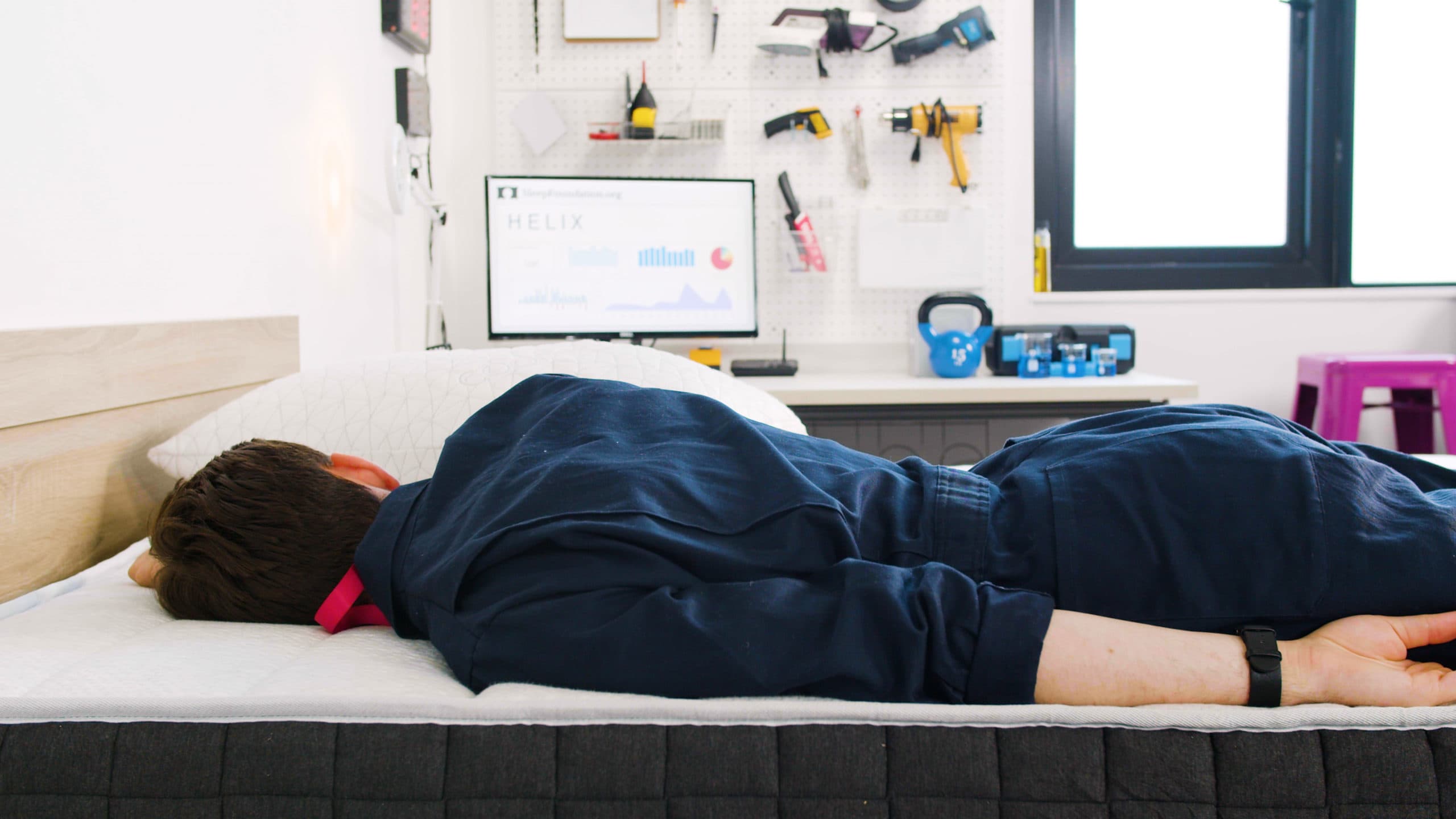
Durability
Designed for heavier bodies, the Helix Plus Luxe is a hybrid mattress that features a highly durable construction and multiple layers of high-density foam for comfort. What really powers its strong score and pushes it past a 10-year lifespan are the 8-inch TitanCore durable steel coils that form the sturdy support core and give the bed a reinforced perimeter.
Full Breakdown
Designed with heavier sleepers in mind, the Helix Plus is one of Helix Sleep’s firmest and most supportive mattresses. This firm (7) luxury hybrid delivers a comfortable experience to its intended audience with dense foam over thick coils. This is a tried-and-true combination for people over 230 pounds who tend to sink excessively on softer mattresses with less robust support systems.
How It Performed
The Helix Plus was a hit among our testers weighing more than 230 pounds and received stellar ratings from all three sleep position groups. Due to the thick foam layers, we found the Helix Plus performed well in areas where hybrid models tend to fall short. Our testers noticed minimal transfer when lying side by side to test for edge support, and we detected little pressure buildup in most of our testers during the pressure relief tests.
At the same time, the mattress felt responsive enough for us to move across the surface without feeling stuck, and our edge support tests revealed solid pushback along the perimeter.
Construction Breakdown
The Helix Plus’ comfort system consists of three foam layers. High-density memory foam cushions the surface, contouring to your body closely and evenly to distribute your weight, followed by polyfoam and memory foam layers that provide additional cushioning while keeping you on an even plane.
The support core contains pocketed coils, extra perimeter reinforcement and a high-density foam base layer. The cover is composed of breathable Tencel fabric. You can order a GlacioTex phase change cover for an additional fee that dissipates body heat on contact.
Best Value Mattress
8.5/10Test Lab Score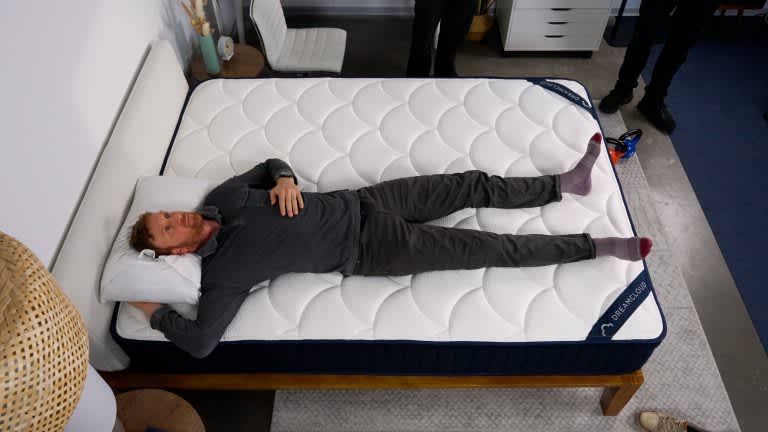
DreamCloud Classic Hybrid
An all-around great hybrid mattress at an affordable price.
Key Details
- Who It’s Best For: Side sleepers over 230 pounds and back sleepers between 130 and 230 pounds.
- Feel: Gentle contouring from the memory foam and a mellow bounce from the coil layer.
- What It’s Made Of: Adaptive polyfoam and memory foam comfort layers over a pocketed coil support core.
- What We Don’t Like: Only one firmness option, which may not provide enough support for back and stomach sleepers over 230 pounds.
Scoring & Reviews
The following ratings show how suitable this mattress is for different sleeping positions and sleeper weights. These scores are determined by how well the mattress supports and relieves pressure for each sleeper type.
In addition to the hands-on feedback from our team, we conduct a number of quantitative tests in our Test Lab. The below ratings are based on the experience of our testers.
SELECT AN ICON TO VIEW DETAILS:
Motion Isolation
During our hands-on evaluations, the DreamCloud provided impressive motion isolation. The layers of foam in the comfort system, including a top layer of memory foam, conform to the body and help prevent vibrations from spreading across the mattress surface. This makes the DreamCloud a good choice for anyone who shares their mattress with a partner.
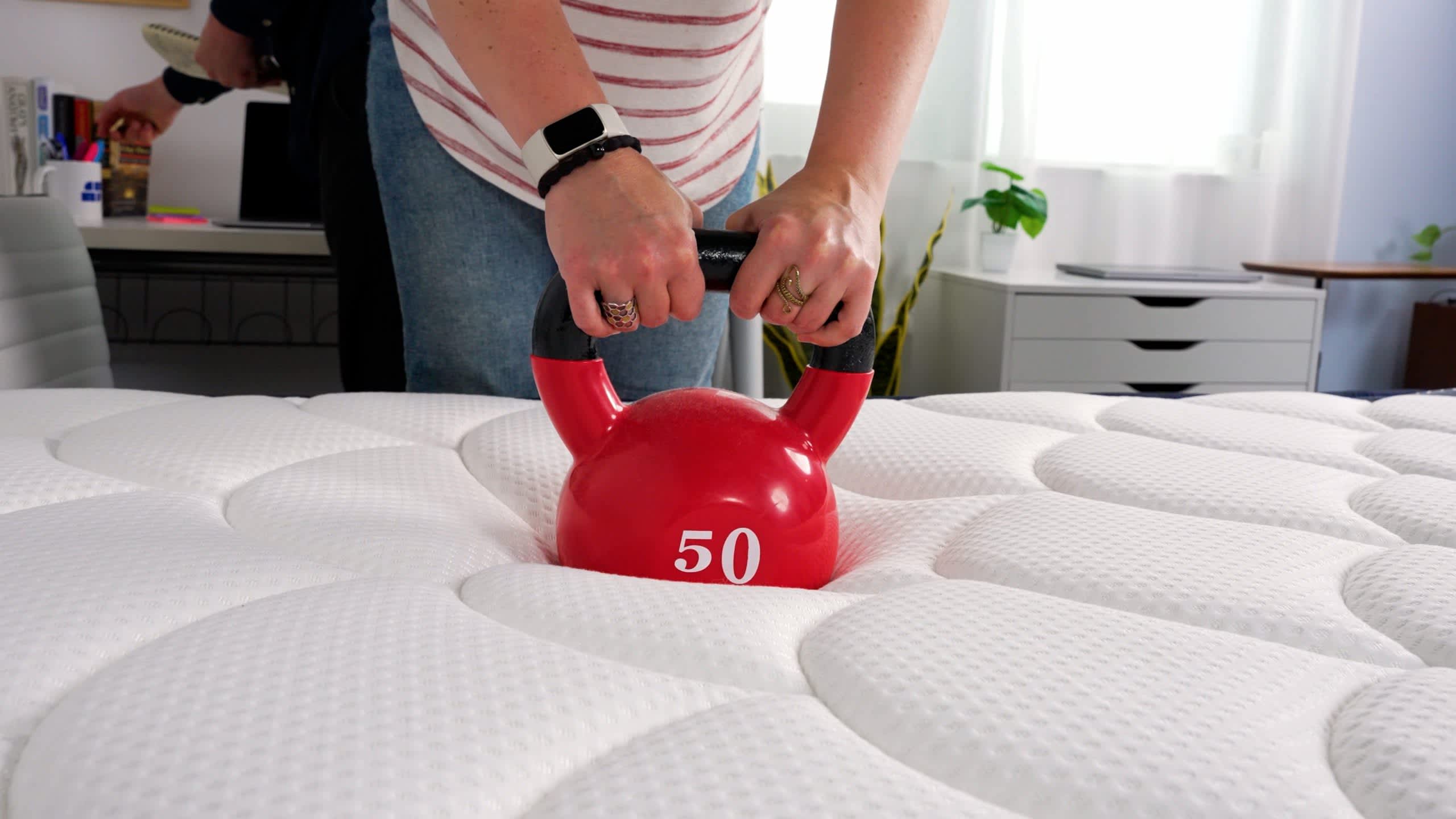
Pressure Relief
Most of our testers appreciated how much pressure this mattress alleviated without feeling excessively soft or enveloping. Its ability to cushion the shoulders, lower back, and hips make it particularly appealing for side sleepers between 130 and 230 pounds and back sleepers up to 230 pounds.
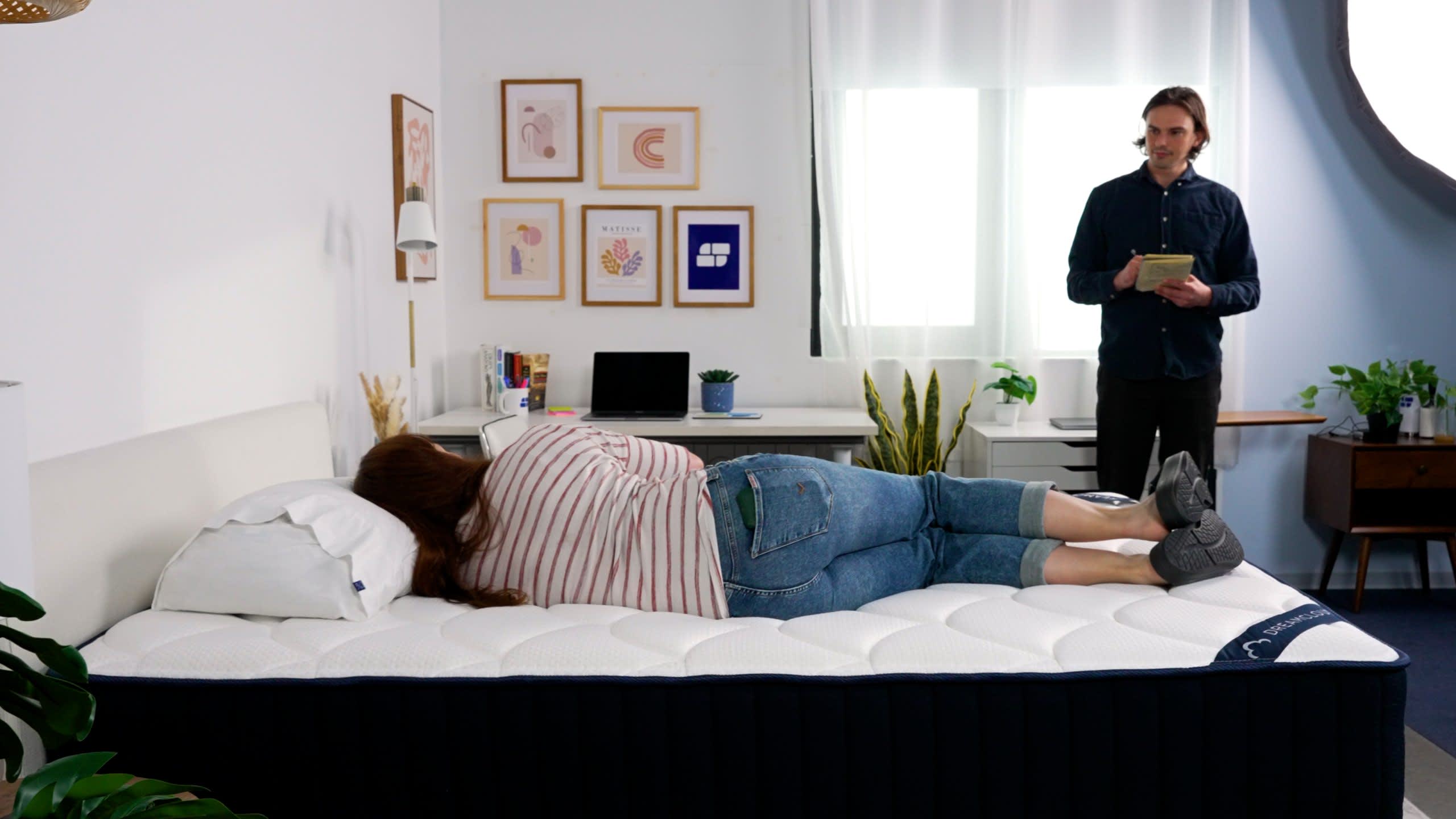
Temperature Control
We found that the DreamCloud Classic delivers above-average temperature control, especially for a mattress with two layers of adaptive foam. A cooling gel infusion in the top layer further reduces heat retention, and air flows easily through the coils for ventilation. Although not the coolest mattress on the market, the DreamCloud Classic offers enough temperature control that even hot sleepers can stay comfortable through the night.
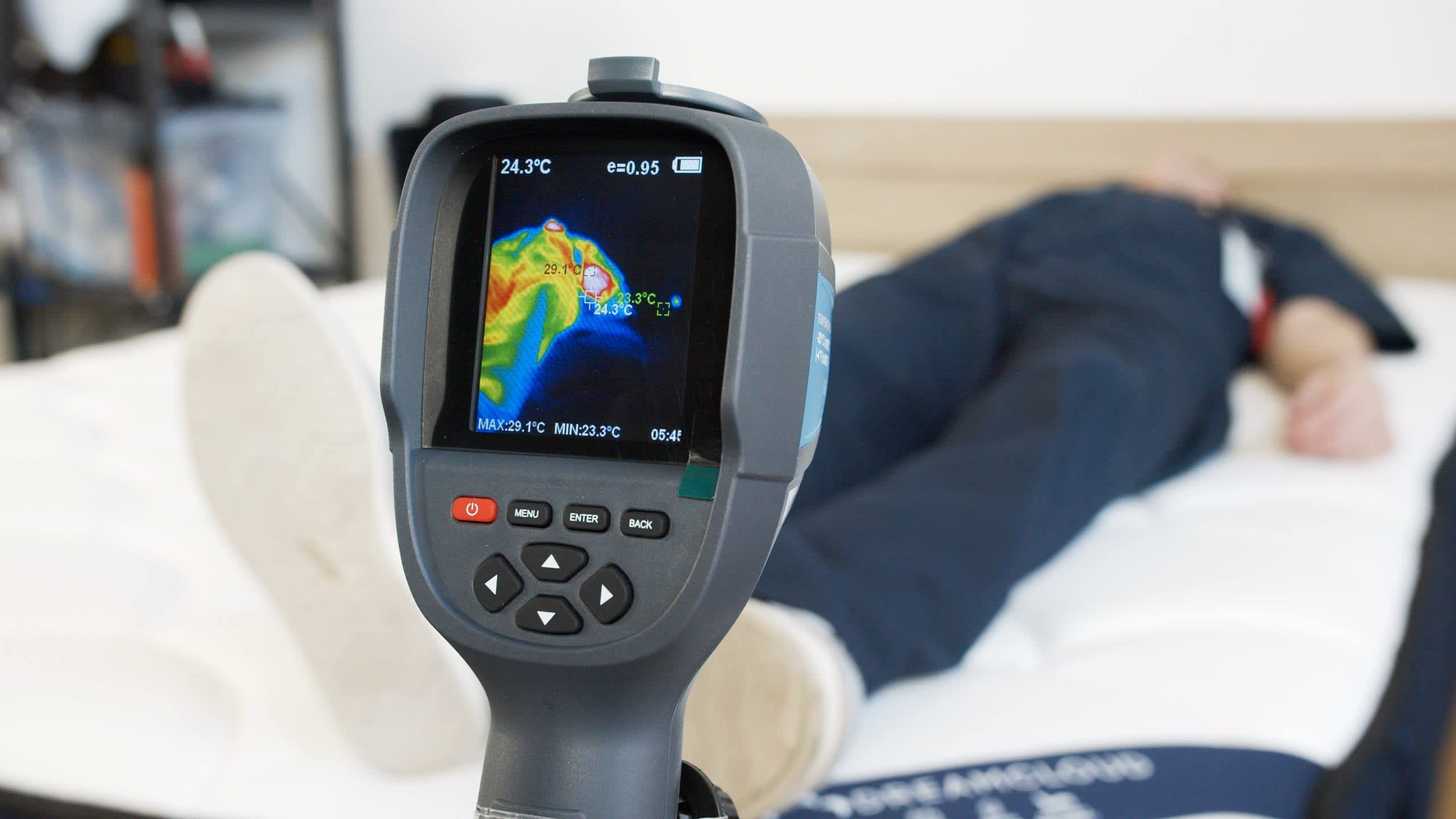
Edge Support
Our testing found that edge support from the DreamCloud was solid. The coils are reinforced around the perimeter, making it easier to feel supported anywhere on the mattress surface. This results in minimal compression when you sleep close to the edges of the mattress or get in and out of bed.
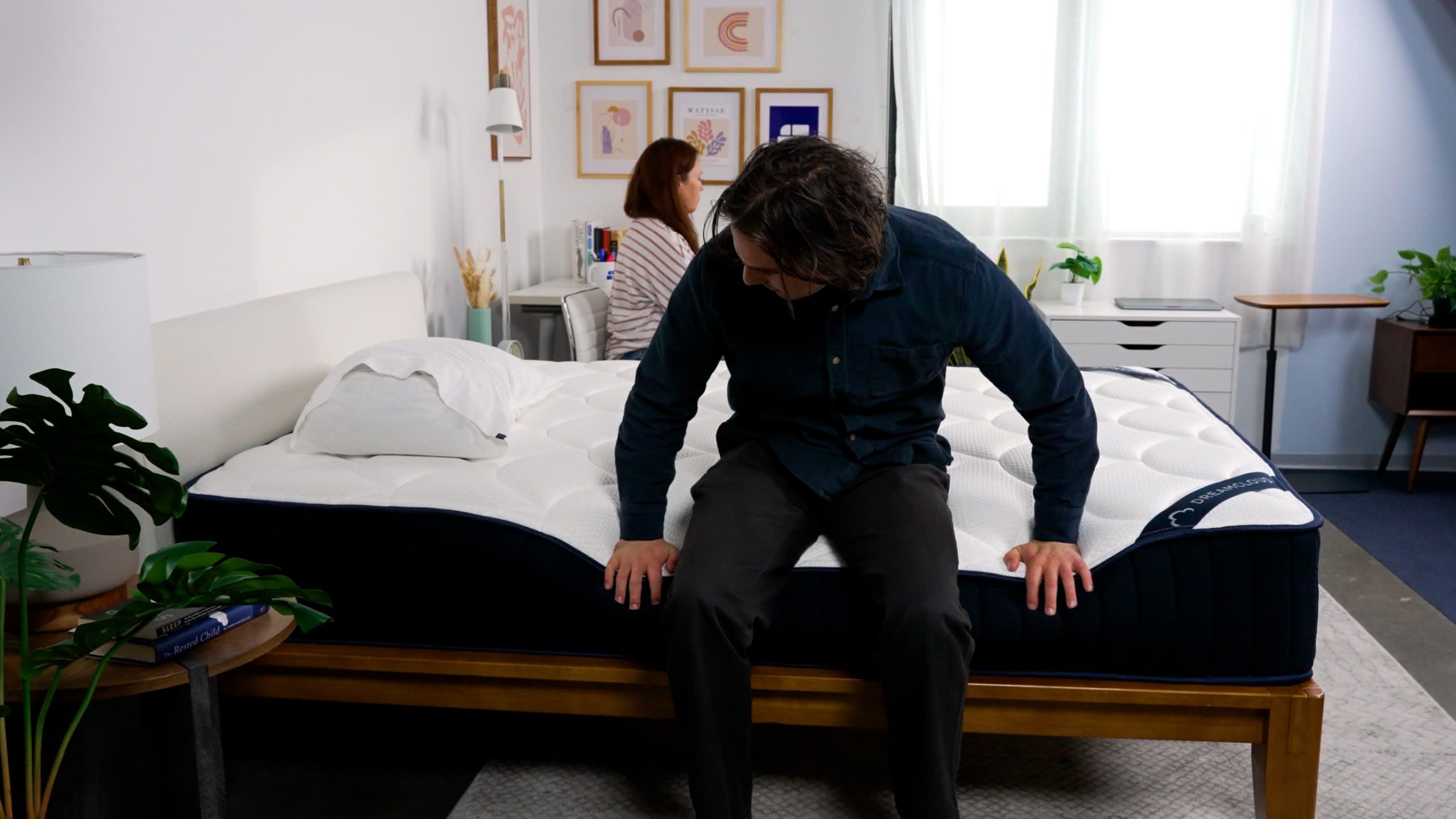
Ease of Movement
We found sufficient ease of movement on the DreamCloud Classic, and there was not much resistance because of its bouncier support core. The memory foam in this mattress gently conforms around the heavier parts of the body. That can make it harder to move on the mattress surface, but our testers didn’t feel like they were stuck in place.
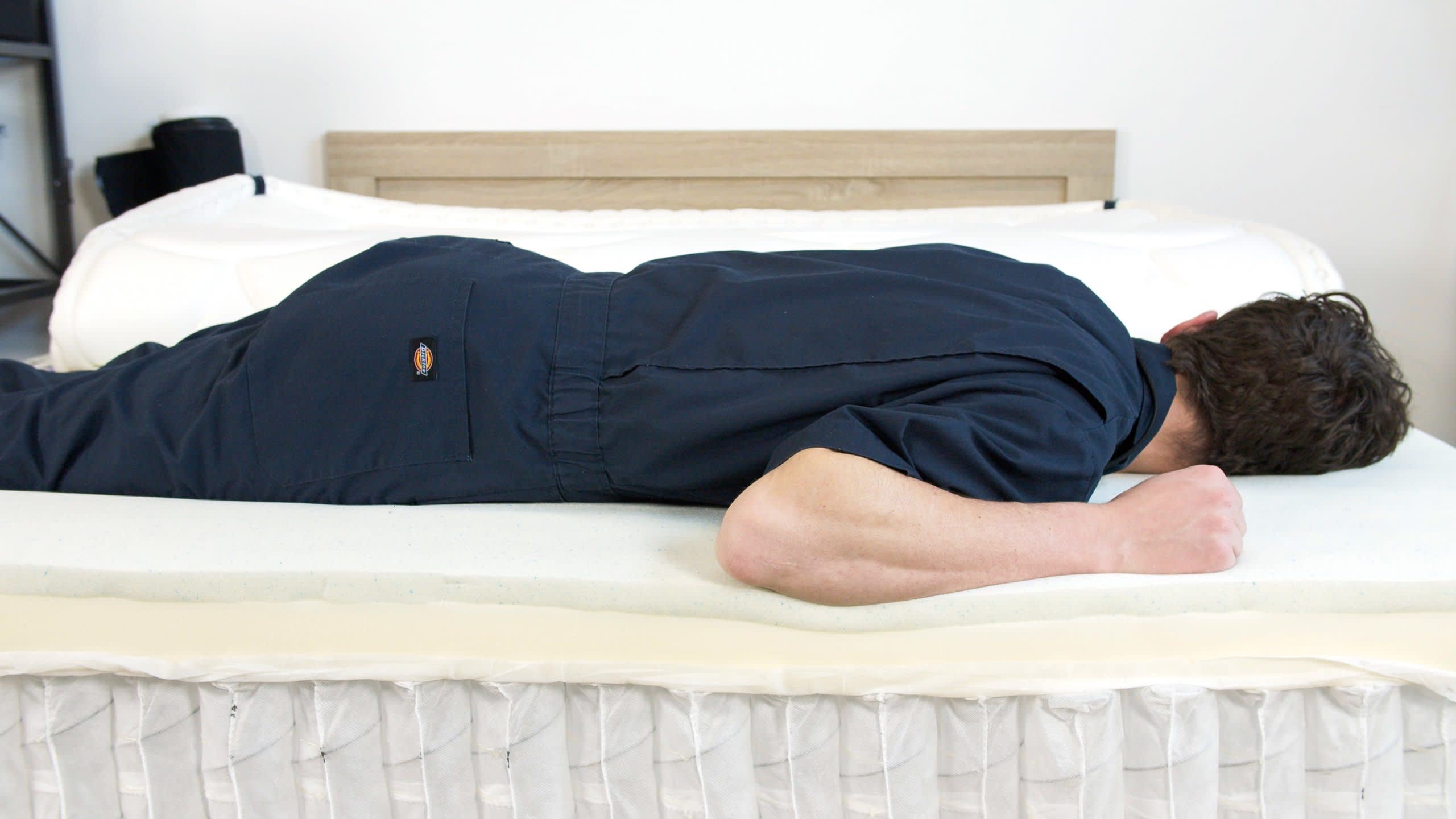
Durability
The DreamCloud Classic Hybrid combines thick inner coils and a memory foam comfort layer to offer a slightly longer-lasting bed than you’d get from an all memory foam option. Though memory foam is the least durable comfort layer material (as compared to polyfoam and latex), the DreamCloud uses one full inch of foam and firmer construction extends the mattress’ lifespan to around eight or nine years.
Full Breakdown
The DreamCloud Classic Hybrid costs far less than the average luxury hybrid yet still manages to perform at the same level as many competing models in terms of pressure relief, temperature control, and overall support. Many of our sleep testers weighing more than 230 pounds were impressed with the deep contouring and lack of sinkage, as mattresses with thick foam layers tend to feel less stable.
How It Performed
Our team’s strongest ratings for the DreamCloud Classic Hybrid came from side sleepers. The thick comfort system delivered much-needed cushioning for sensitive areas like the shoulders and hips. Meanwhile, the robust coil system kept most of our back and stomach sleepers on a mostly even plane.
Hybrids we’ve tested generally perform well for temperature control due to their gel-infused comfort layers and consistent internal airflow. The DreamCloud Classic Hybrid raises the bar with a breathable stretch-fabric cover and cooling gel infusion in the top layer.
The thick foam layers also earned the mattress above-average ratings for pressure relief and motion isolation compared to other hybrid models.
Construction Breakdown
Memory foam quilted into the DreamCloud’s cover gives the surface an invitingly plush feel. Transitional polyfoam reinforces this gentle cushioning, but these layers are progressively denser to help your body settle without sinking too much. Pocketed coils and high-density base foam provide a sturdy support system for the mattress.
The stretch-blend cover resists overheating and feels luxuriously soft. We’ve rated the DreamCloud Classic Hybrid as medium firm (6), but expect more contouring from this mattress than you’d normally find on a model with this firmness level. We attribute this to the thick 12-inch profile ensuring plenty of space for a deep comfort system and robust coil support.
Best Mattress for Back Pain
9.9/10Test Lab Score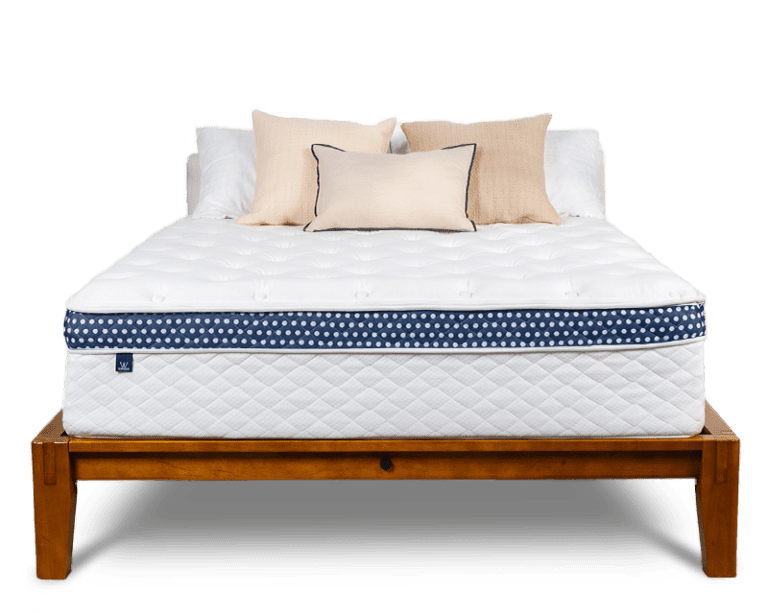
WinkBed Plus
High end hybrid bed providing ample support, cushion, and cool sleep.
Key Details
- Who It’s Best For: Side sleepers over 230 pounds and back and stomach sleepers weighing at least 130 pounds.
- Feel: A firm, bouncy surface and zoned coil support with extra pushback beneath the midsection.
- What It’s Made Of: Adaptive foam and three-zone latex over pocketed coils with extra midsection support and a reinforced perimeter.
- What We Don’t Like: Motion transfer may disrupt sleep for couples.
Scoring & Reviews
The following ratings show how suitable this mattress is for different sleeping positions and sleeper weights. These scores are determined by how well the mattress supports and relieves pressure for each sleeper type.
In addition to the hands-on feedback from our team, we conduct a number of quantitative tests in our Test Lab. The below ratings are based on the experience of our testers.
SELECT AN ICON TO VIEW DETAILS:
Motion Isolation
While latex and coils tend to be more responsive than traditional memory foam, we found the WinkBed Plus still performed well for motion isolation. During our testing, we noticed only light surface transfer when one tester moved around — a solid outcome for a bed built for heavier sleepers with firmer materials.
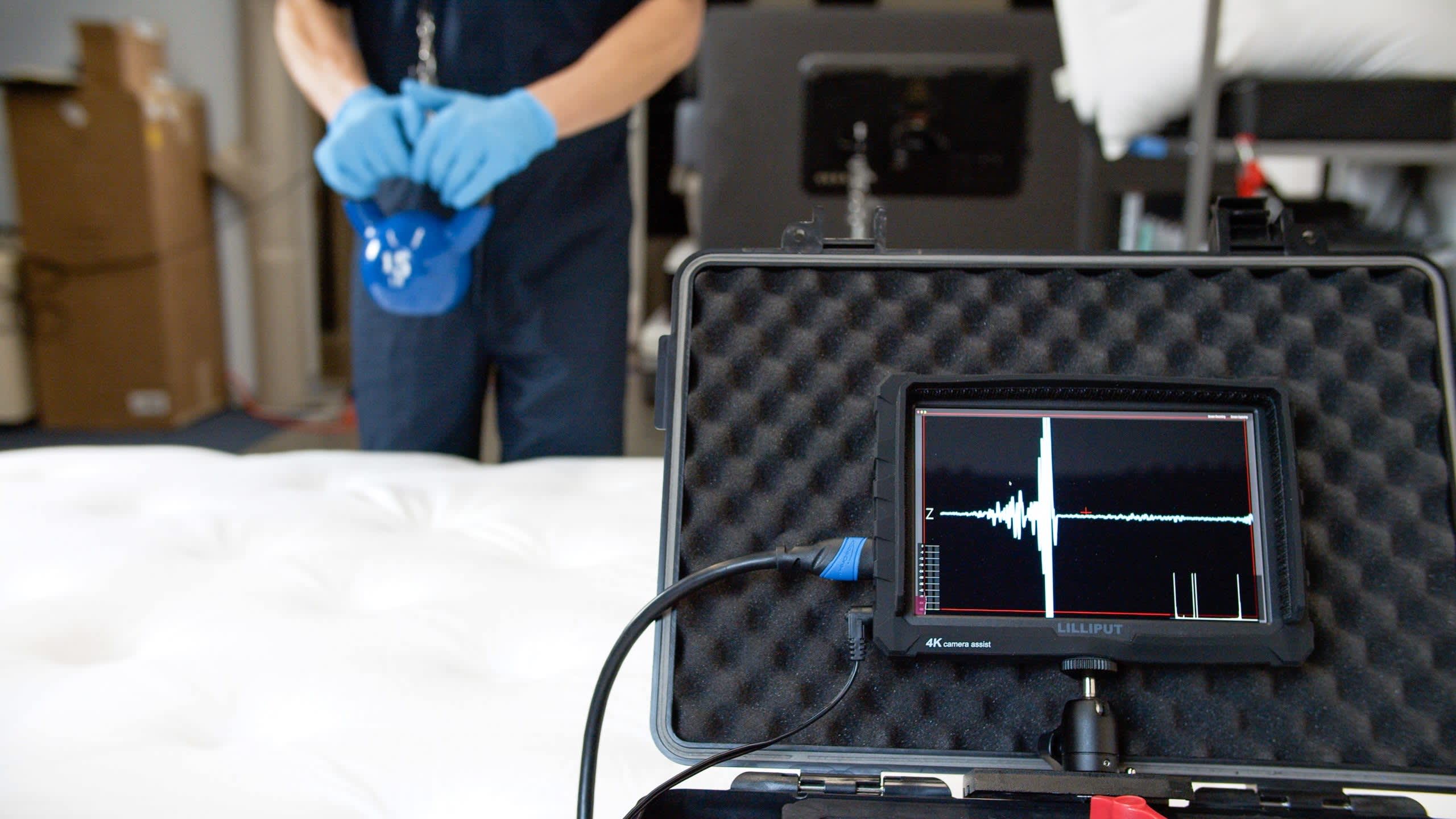
Pressure Relief
While the WinkBed Plus is on the firmer side, we found the Euro-top and latex layer provided just enough contouring to relieve pressure — especially around the shoulders and hips for heavier side sleepers. The zoned support really shined in back and stomach sleeping positions, keeping the spine aligned without compromising comfort.
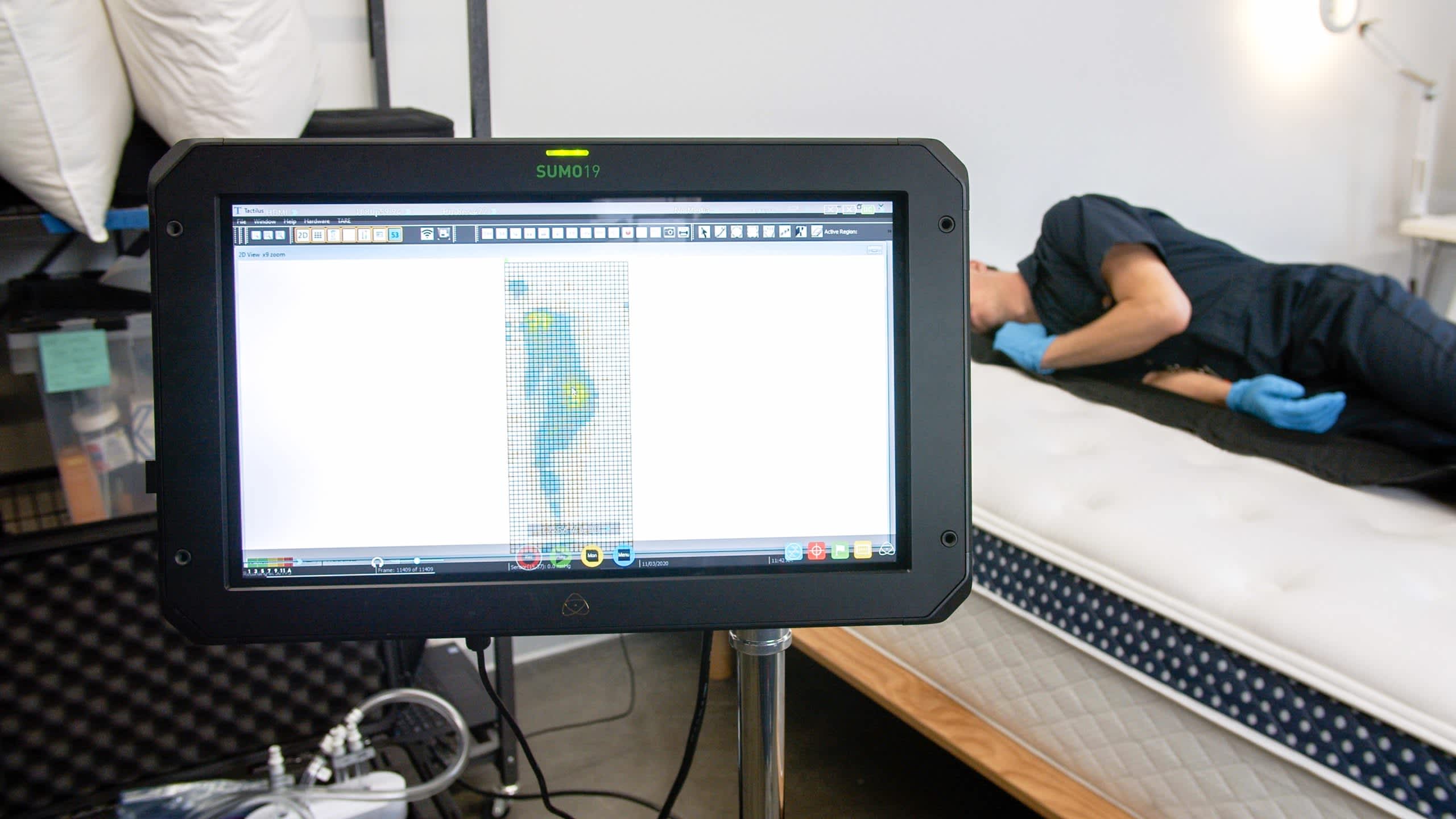
Temperature Control
The WinkBed Plus excelled at regulating temperature. The breathable Tencel cover, responsive latex layer, and open coil system all worked together to promote airflow and prevent overheating. Even during extended use, our testers felt the surface stayed comfortably cool throughout the night.
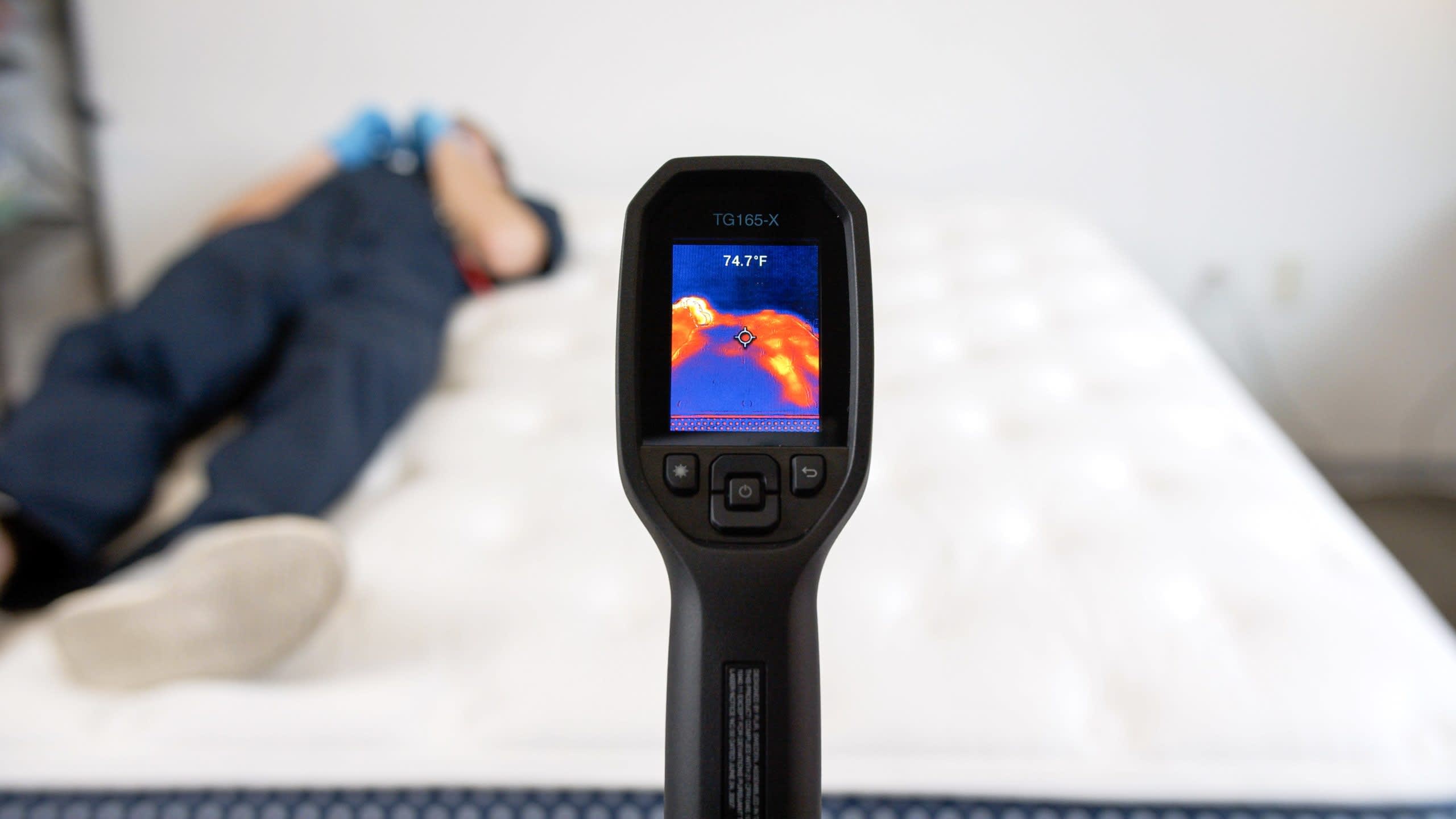
Edge Support
Edge support was a major highlight during our evaluation. Thanks to reinforced coils along the perimeter, none of our testers felt unstable sitting or lying near the edge — even those weighing well over 230 pounds. The edges felt incredibly sturdy, adding usable surface space and making it easy to get in and out of bed.
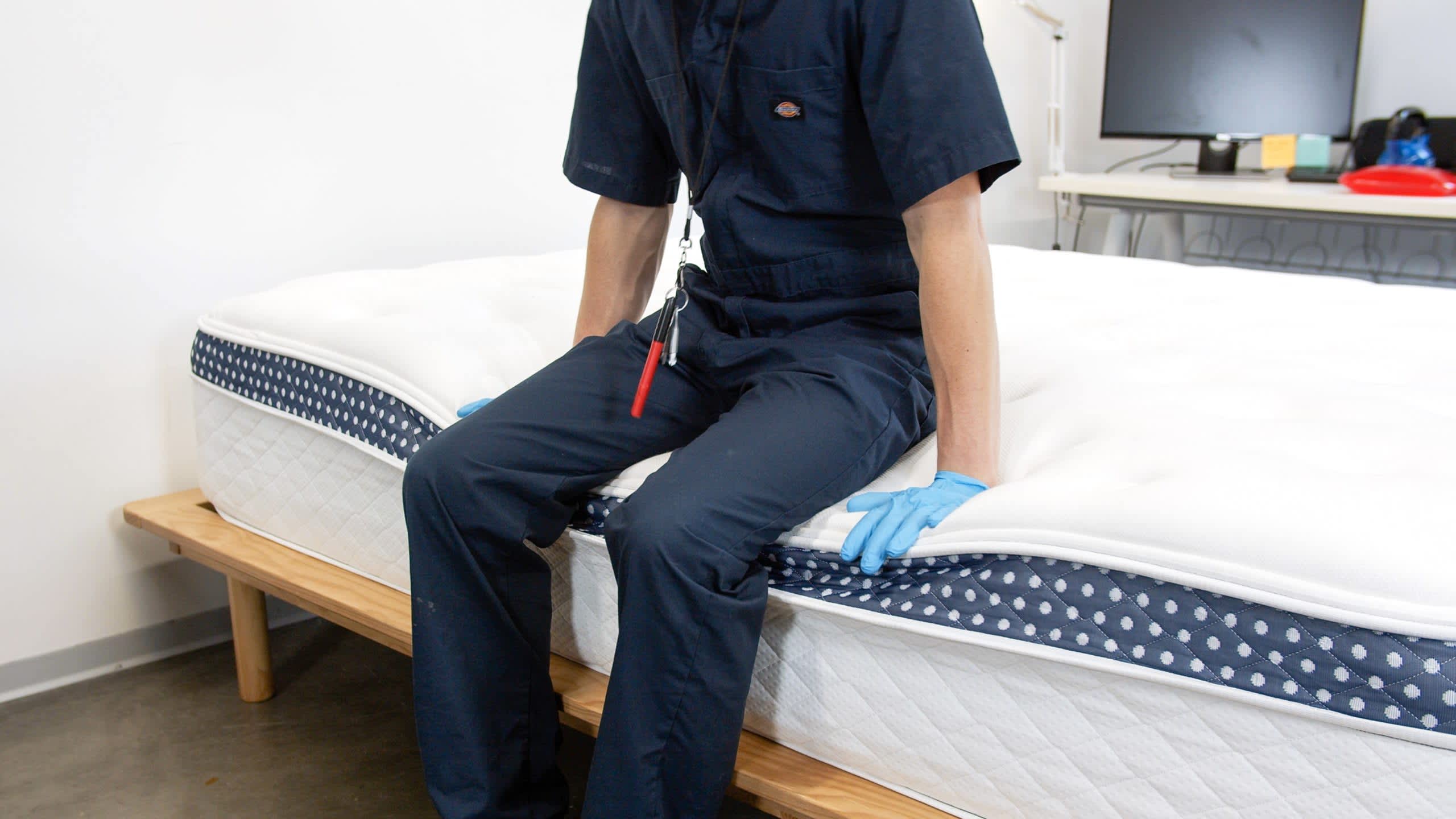
Ease of Movement
This mattress is built for mobility. The buoyant latex and ultra-supportive coil core gave the bed a springy, responsive feel that made it easy for us to change positions or move across the surface. Heavier testers in particular noted how effortlessly they could reposition without sinking or feeling stuck.
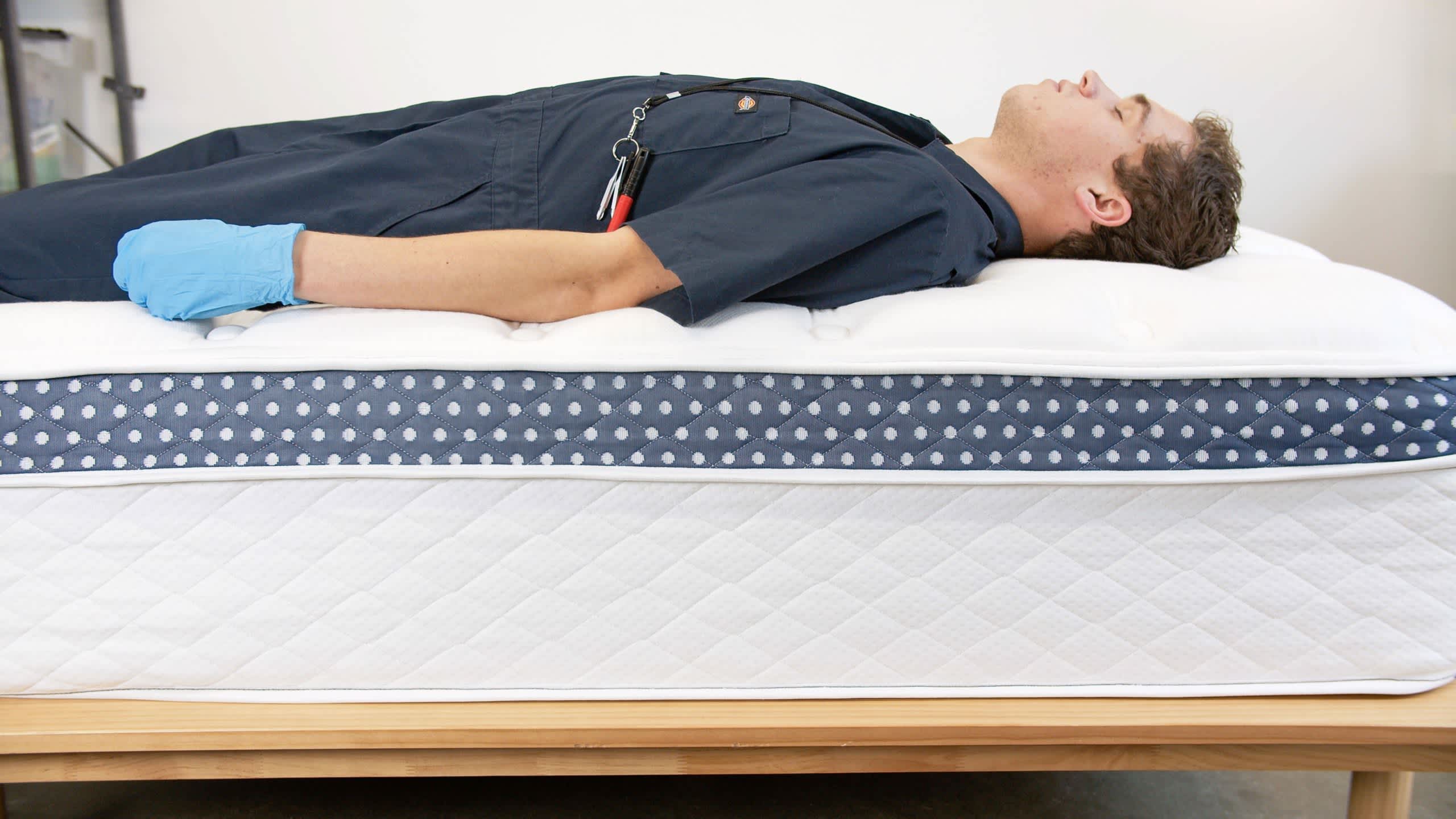
Durability
Full Breakdown
The WinkBed is a luxury hybrid available in four firmness levels. The firmest option is the WinkBed Plus (8), one of the only mattresses on the market designed with heavier individuals in mind. Our testers found the mattress’ zoned comfort and support layers provide enhanced reinforcement from head to toe and noticed significant pushback around the torso and hips — two areas where people tend to carry a disproportionate amount of weight.
How It Performed
As expected, the WinkBed Plus earned strong ratings from our testers weighing more than 230 pounds across all three position groups. Gentle cushioning from the latex comfort layer combined with three-zone coil support helped ensure plenty of pushback and reinforcement for these team members.
We also gave the WinkBed Plus high marks for temperature control, as these tests revealed minimal heat buildup on the surface. Edge support tests were another highlight. The extra perimeter reinforcement allowed us to sit and lie along the edges of the mattress without feelings of “roll-off,” which we liken to being ejected by the mattress as it buckles beneath your weight.
Construction Breakdown
The WinkBed Plus differs in construction from the other three WinkBed models. A Euro-top cushioned with adaptive foam creates some light cushioning on the surface, but the zoned latex comfort layer responds quickly to compression and keeps you on an even plane.
The latex feels firmer and more supportive beneath your chest, stomach, and hips. In the support core, the coils are arranged similarly with thicker springs beneath your midsection for extra pushback. A cover made of breathable, moisture-wicking Tencel encases the mattress. For an extra fee, you can upgrade to a “Frost” cover woven with specialty cooling fibers – this add-on may be a worthwhile investment if you consider yourself a very hot sleeper.
The Firmer WinkBed (7) also fared well among our heavier testers, earning “excellent” ratings from side, back, and stomach sleepers weighing more than 230 pounds.
Best Mattress for Couples
8.4/10Test Lab Score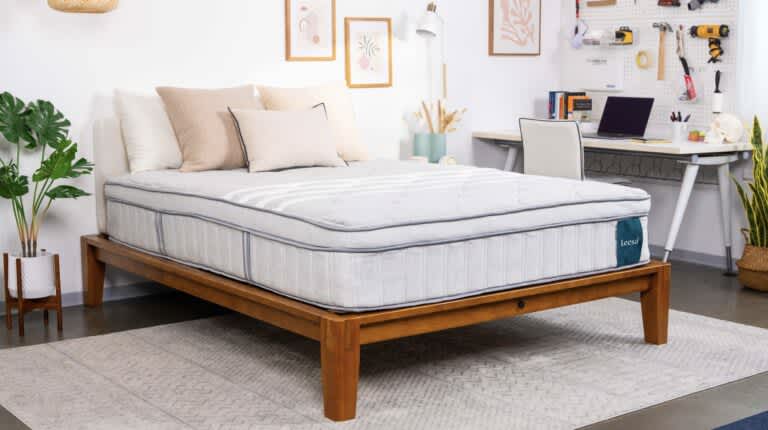
Leesa Plus Hybrid Mattress
Sturdy design, temperature control, and moderate cushioning.
Key Details
- Who It’s Best For: Side sleepers who weigh more than 230 pounds and back sleepers between 130 and 230 pounds.
- Feel: Mid-level cushioning with a light bounce in response to your movements.
- What It’s Made Of: A comfort system with three adaptive polyfoam layers over a support core of pocketed coils and dense base foam.
- What We Don’t Like: Stomach sleepers over 230 pounds may sink too much and experience lower back pain.
Scoring & Reviews
The following ratings show how suitable this mattress is for different sleeping positions and sleeper weights. These scores are determined by how well the mattress supports and relieves pressure for each sleeper type.
In addition to the hands-on feedback from our team, we conduct a number of quantitative tests in our Test Lab. The below ratings are based on the experience of our testers.
SELECT AN ICON TO VIEW DETAILS:
Motion Isolation
We found that the Leesa Plus Hybrid offers average motion isolation for a hybrid mattress.The foam layers and pocketed coils work to reduce how much vibration ripples across the bed, but there’s a degree of bounciness that makes some motion transfer inevitable.Based on our testing, we don’t think this will pose an issue for most couples or co-sleepers, but it could be a drawback for people who are easily stirred from sleep by movement in their bed.
Pressure Relief
Our testing team gave high marks to the Leesa Plus Hybrid for its ability to relieve pressure and promote healthy spinal alignment.The top foam layers are most responsible for cushioning the body, adapting to the body’s weight and pressure. The bottom layers, including the coils, help create balance by resisting excess sinkage.
Temperature Control
The Leesa Plus Hybrid resists heat buildup well. The foams in the comfort system, including the gel-infused top layer, help minimize heat retention. The coils also provide space for ventilation to keep the mattress from getting too hot.People who are very hot sleepers may want a mattress with more elaborate cooling features, but our testing suggests that most people will have no issues staying at a comfortable temperature on the Leesa Plus Hybrid.
Edge Support
We found the Leesa Plus Hybrid offers impressive edge support, making it ideal for individuals who want to use the entire surface area of their mattress or who often sit on the edge of the bed.This perimeter support can be attributed to reinforced coils that run along the perimeter of the mattress. These coils, along with the denser support foams, help maintain a dependable edge without bothersome sagging.
Ease of Movement
Our testers found that the Leesa Plus Hybrid was average or slightly below average for ease of movement. Although the mattress doesn’t significantly impede movement, it doesn’t have the springiness that you find in many hybrid or innerspring mattresses.None of our combination sleepers felt that this was a serious problem, but it may be a consideration for people who want a mattress that feels like it gives you a little push when you adjust your body’s position.
Durability
The Leesa’s 4-inch comfort system and thick pocketed coil core combine to deliver ongoing support and pressure relief. Specifically, the coils are 13.5-gauge, which is one of the thickest you’ll find in the mattress industry. These components are designed to withstand a combined sleeper weight of over 1,000 pounds without prematurely wearing out. We expect this mattress to last a good 6.5 to 7.5 years, and you can extend the lifespan by regularly rotating it.
Full Breakdown
The Leesa Plus Hybrid breaks from the trend of strong support but minimal contouring with a design that delivers ample cushioning without sacrificing reinforcement and stability. These qualities should appeal to anyone weighing more than 230 pounds who wants a bit of padding from their sleep surface but also needs steady pushback to keep their body on an even plane.
How It Performed
During our tests, the Leesa Plus earned higher ratings across different body type and sleep position groups than many competing models created for heavier individuals. This can be attributed to the balanced medium firm (6) feel and generous cushioning layers.
Temperature control is one of the Plus Hybrid’s defining strengths. Cooling gel infused into the top foam layer, a moisture-wicking cover, and steady airflow through the coils all contribute to the bed’s excellent thermoregulation.
Other testing highlights included edge support and ease of movement, and most of our testers who weigh more than 230 pounds reported little to no pressure buildup when lying on the mattress.
Construction Breakdown
The Plus Hybrid’s comfort system consists of three polyfoam layers, each one progressively denser to keep the surface comfortable and prevent you from sinking excessively. Responsive transitional foam also produces a light bounce when compressed, and this can help you move across the surface without feeling stuck.
Pocketed coils and dense base foam stabilize the mattress nicely. The perimeter coils are reinforced to push back against weight, allowing you and your partner to comfortably use the entire surface for sleep or sex. A cooling cover made from a blend of polyester and viscose encases the mattress.
Best Mattress for Side Sleepers
9.0/10Test Lab ScoreNolah Evolution Comfort+
This mattress delivers a combination of cushioning, pushback, and bounce.
Key Details
- Who It’s Best For: Side sleepers over 230 pounds and back and stomach sleepers up to 230 pounds.
- Feel: Light surface cushioning and responsive, multi-zoned coil support.
- What It’s Made Of: Four polyfoam comfort layers over pocketed coils with zoned torso and hip support.
- What We Don’t Like: May not contour closely enough for people with back pain or pressure points.
Scoring & Reviews
The following ratings show how suitable this mattress is for different sleeping positions and sleeper weights. These scores are determined by how well the mattress supports and relieves pressure for each sleeper type.
In addition to the hands-on feedback from our team, we conduct a number of quantitative tests in our Test Lab. The below ratings are based on the experience of our testers.
SELECT AN ICON TO VIEW DETAILS:
Motion Isolation
It’s somewhat unusual for a hybrid to isolate motion this well, but the Evolution Comfort+ manages it with ease. The thick comfort system absorbs movement, so co-sleepers are less likely to wake up when their partner adjusts positions. The pocketed coil core also reduces surface vibrations, since each spring moves independently.
Pressure Relief
The Evolution Comfort+ offers solid pressure relief. Its Euro-top gently cushions, while the AirFoam layer redistributes weight to alleviate tension. The pocketed coil core also reduces pressure buildup because its zones give you more pushback where you need it and extra cushioning where you don’t.That said, our side sleeping testers under 130 pounds said they didn’t weigh enough to get significant pressure relief from this bed.
Temperature Control
Our testers were impressed with the mattress’ solid temperature control. The airy cotton cover has thermally conductive fibers designed to dissipate heat, and the gusseted Euro-top ventilates the comfort system.While some types of foam are prone to heat retention, AirFoam is designed for breathability, so it doesn’t trap as much heat as close-conforming memory foam. The pocketed coil support core also has plenty of gaps to disperse heat.
Edge Support
We didn’t notice much compression when sitting or lying along the sides of the Evolution Comfort+. Responsive foam comfort layers minimize sinkage, while a reinforced perimeter boosts edge support. Co-sleepers should be able to spread out on the mattress and feel consistent support.
Ease of Movement
As a mattress designed for heavier people, the Evolution Comfort+ resists sagging and regains its shape quickly when sleepers move, preventing deep impressions that could otherwise feel confining. The springy pocketed coil core also facilitates movement, while a sturdy perimeter makes getting in and out of bed easier. However, those looking for an exceptionally bouncy bed may want a latex hybrid instead.
Durability
The Nolah Evolution has a sturdy design and will likely outlast many of its competitors. The ample comfort system evenly distributes body weight to relieve premature wear on any one area of the bed, with firmer areas under the hips to prevent sagging. The 8-inch pocketed coil base is also zoned, ensuring many years of solid spinal support. With proper care, the Evolution should stay with you for upwards of seven years.
Full Breakdown
Thanks to deep foam layers in the comfort system and coils engineered to feel more robust where people carry most of their weight, the firm (7) Nolah Evolution Comfort+ balances the cushioning and support side sleepers need.
How It Performed
Our testers noticed a plush feel on the Evolution Comfort+ when first lying on the mattress, followed by gentle pushback as their bodies settled. This adaptive, sink-free cradling comes from the progressively denser foam layers.
Temperature control was a major testing highlight. An open-cell composition allows each foam layer to resist heat buildup, the coils circulate plenty of air throughout the interior, and the cover is composed of breathable organic cotton woven with cooling ArcticTex fibers.
Our tests also show that the Evolution Comfort+ performs well in areas where hybrids often fall short, such as motion isolation for couples and pressure relief, but the mattress also feels stable around the perimeter and doesn’t sink too much when you move across its surface.
Construction Breakdown
The Evolution Comfort+ begins with a Euro-top containing four polyfoam layers. The two topmost layers are thicker and fairly adaptive, while the underlying two layers are dense and fairly firm.
This helps ensure even cushioning for your body without too much compression around the midsection. Zoned coils in the support core also help keep your body on an even plane. Thicker coils line the perimeter to stabilize the edges, as well.
The cover is made from a blend of organic cotton and proprietary ArcticTex fibers, the latter of which is a phase change material engineered to dissipate heat on contact.
The Evolution Comfort+ measures 14 inches thick and is considered a high-profile mattress, making it compatible with most fitted sheets — but we recommend measuring your sheet’s pocket depth to determine whether you’ll need new bedding for this mattress.
Best Mattress for Hot Sleepers
8.7/10Test Lab Score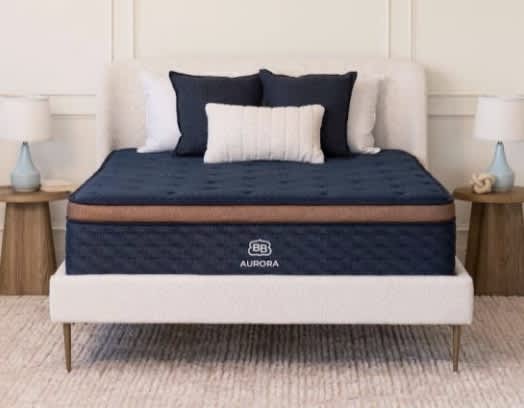
Brooklyn Bedding Aurora Luxe
Luxury hybrid with deep foam layers and cooling technology.
Key Details
- Who It’s Best For: Side, back, and stomach sleepers across different weight groups – but choosing the right firmness for your body type is key.
- Feel: Depending on the firmness, the memory foam may hug deeply or barely conform to the body. You’ll notice extra pushback from the zoned coils around your midsection.
- What It’s Made Of: Comfort layers of copper-infused polyfoam and memory foam, followed by a pocketed coil support core with dense base foam.
- What We Don’t Like: Strong off-gassing odor for the first few nights, and the foam layers may hinder movement on the surface.
Scoring & Reviews
The following ratings show how suitable this mattress is for different sleeping positions and sleeper weights. These scores are determined by how well the mattress supports and relieves pressure for each sleeper type.
In addition to the hands-on feedback from our team, we conduct a number of quantitative tests in our Test Lab. The below ratings are based on the experience of our testers.
SELECT AN ICON TO VIEW DETAILS:
Motion Isolation
We found the Aurora Luxe provides above-average motion isolation. Although the coil system gives the mattress a somewhat bouncy feel, the bed absorbs movement from sleepers and eliminates most motion transfer across the surface.The medium soft and medium firm Aurora Luxe models isolate motion especially well. The firm model feels a bit springier on the surface, resulting in slightly more transfer, but overall the mattress earns favorable ratings in this category.
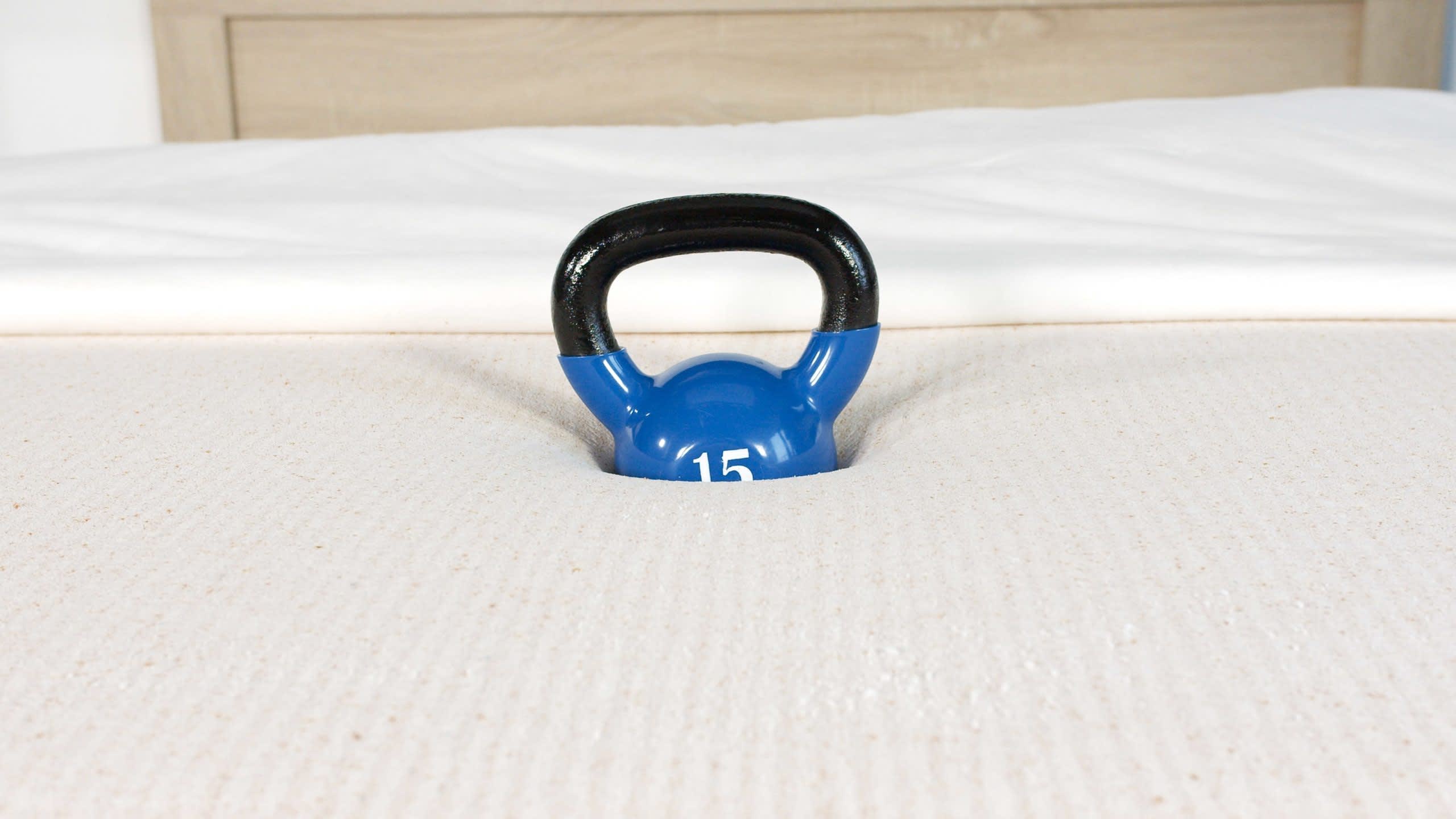
Pressure Relief
Our tests show the Aurora Luxe excels at pressure relief across each firmness level. It’s important to choose a design that reduces pressure for your specific body type and sleep position.If you sleep on your side and/or weigh 130 pounds or less, the medium soft feel should alleviate pressure due to its close contour. If you sleep on your back or stomach and/or weigh 130 pounds or more, the medium firm or firm feel should offer sufficient pressure relief without too much sagging.
Temperature Control
We ran temperature tests on the Aurora Luxe using thermal cameras and collected subjective feedback from testers who sleep hot. We found the mattress sleeps fairly cool thanks to steady airflow through the coil system. The cover of the Aurora Luxe also has cooling fibers intended to prevent heat buildup.The medium soft model may trap more heat than the other two, since deeper cushioning can restrict airflow. If you’re a hot sleeper, we recommend the medium firm or firm model.
Edge Support
Our testers sat on the edge of the Aurora Luxe and measured how deeply the bed compressed. With pocketed coils and perimeter reinforcement, the Aurora Luxe’s support system was quite robust. You won’t sink too much when getting in and out of bed, as you might on an all-foam mattress.The medium soft Aurora Luxe is a bit weaker along the perimeter than the other two firmness levels. This is especially true for sleepers who weigh more than 230 pounds.
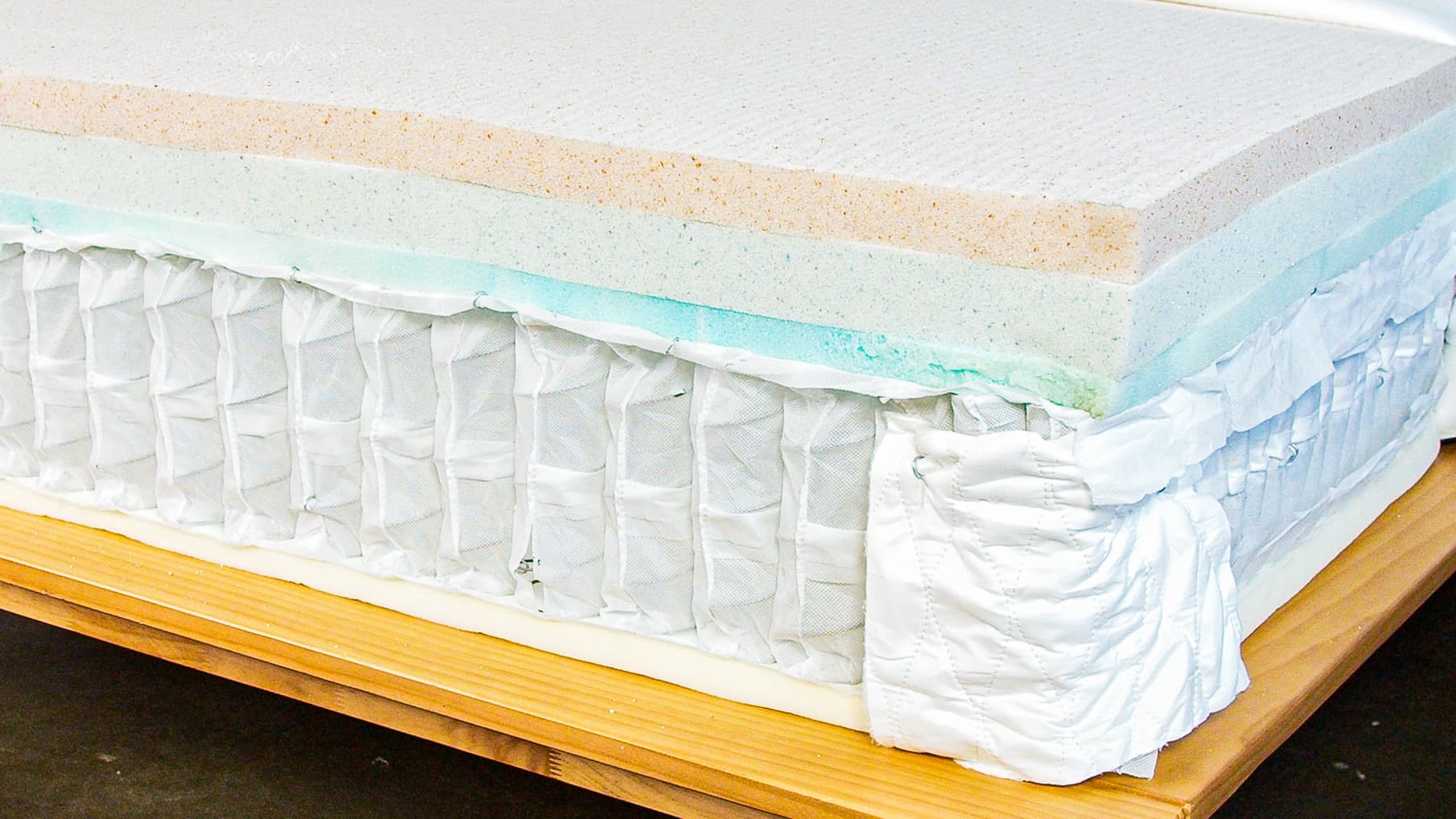
Ease of Movement
Our ease of movement tests, which involve us rolling around on the beds and dropping kettlebells on them to measure how quickly their surfaces recover, show the medium firm and firm models are quite responsive to movement. That said, your body weight and chosen firmness level are key. The firm Aurora Luxe sinks the least and promotes movement well. You may have a harder time moving on the medium soft model because it sinks more. This is especially true for people over 230 pounds.
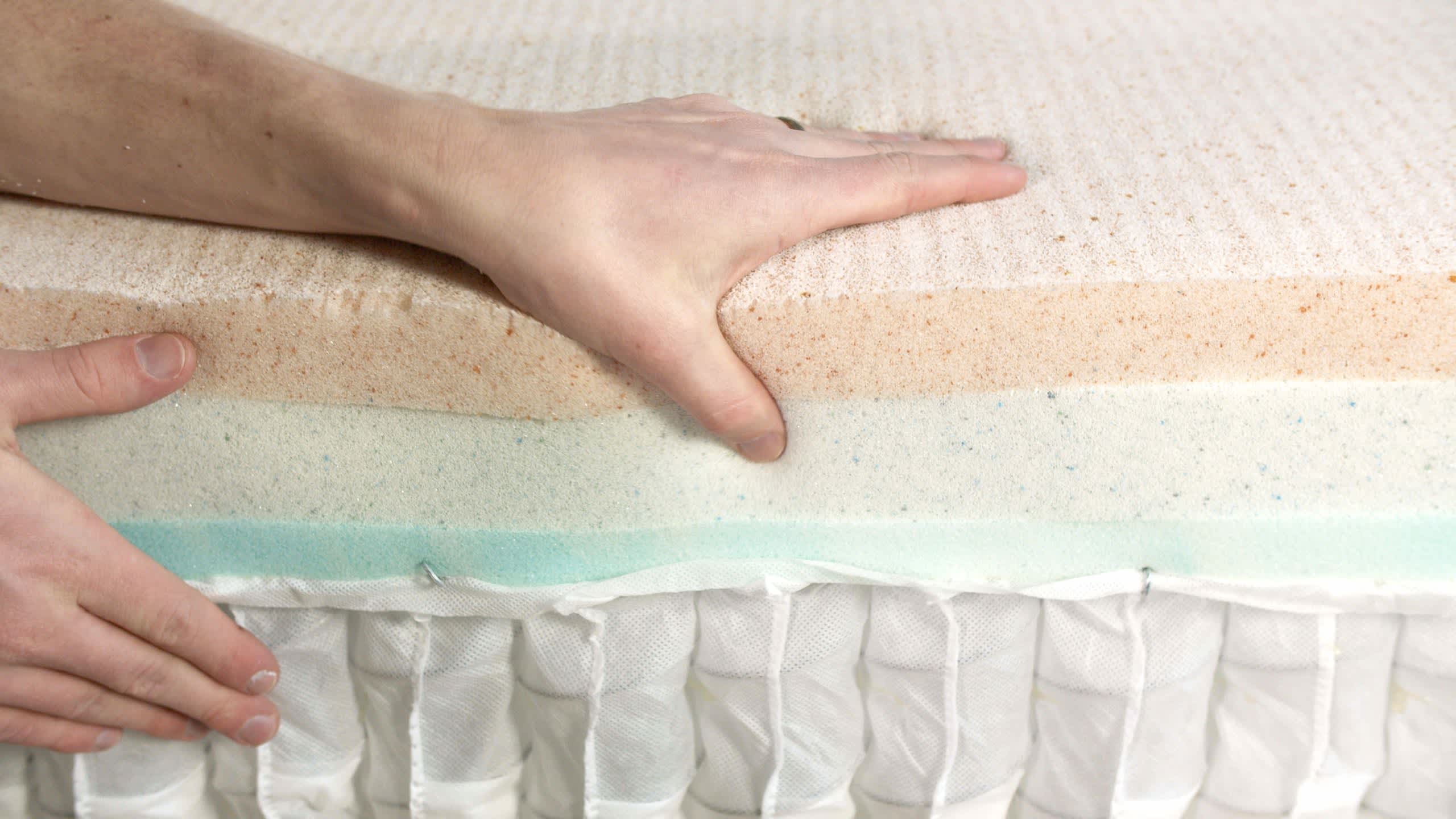
Durability
Across all four models of the Brooklyn Bedding Aurora Luxe, we expect a longer-than-average lifespan of at least seven to eight years. This mattress uses high-quality foams that maintain their shape over time, even in the softer models. The thick comfort system also helps ensure you won’t sink onto the coils. Given its durable build, we find the Aurora Luxe offers excellent value for money.
Full Breakdown
If you weigh more than 230 pounds and sleep hot, the Brooklyn Bedding Aurora Luxe should check both boxes. Foam layers infused with copper and phase change material, coils that promote ample airflow throughout the interior, and a breathable cover all contribute to the Aurora Luxe’s superior temperature control.
How It Performed
You can choose from three firmness levels — our tests show the firm (8) is a good match for most people over 230 pounds, but the medium soft (4) and medium firm (6) provide a deeper contour if that aligns with your needs and preferences.
Most members of our testing team who weigh more than 230 pounds preferred the firm model. While the foams offer some cushioning, the surface doesn’t sink and remains flat and even. There’s also some extra bounce from the coils to ensure sufficient pushback beneath the torso and hips.
The medium firm model also might be suitable for people in this weight range who prefer a slightly closer contour from their mattress. All testers over 230 pounds agreed support was too lacking with the medium soft model.
Temperature control is a major strength of the Aurora Luxe, especially compared to other foam hybrids on the market. We noticed minimal heat buildup in the foam layers, along with cooling bursts that helped the surface stay comfortable.
The medium soft model excels at motion isolation and pressure relief — two performance areas where hybrids often struggle — while the medium firm and firm models earned higher ratings in testing categories like edge support and ease of movement.
Construction Breakdown
The Aurora Luxe’s comfort system contains three layers, beginning with 1.5 inches of adaptive polyfoam infused with copper fibers and phase change material.
Underlying polyfoam and transitional memory foam layers add to the plush, comfy feel of the Euro-top surface. For an extra fee, you can opt for the “Cooling Pillow Top” upgrade to your mattress. This add-on consists of a fourth foam layer encased in heat-dissipating fabric.
The support core’s pocketed coils are divided into three zones with extra strength beneath your midsection. Thicker coils also line the perimeter to prevent sinkage when you get in and out of bed. High-density base foam completes the hybrid design, and the standard-issue cover is made of polyester woven with phase change material for added cooling.
Best Mattress for Hip Pain
8.5/10Test Lab Score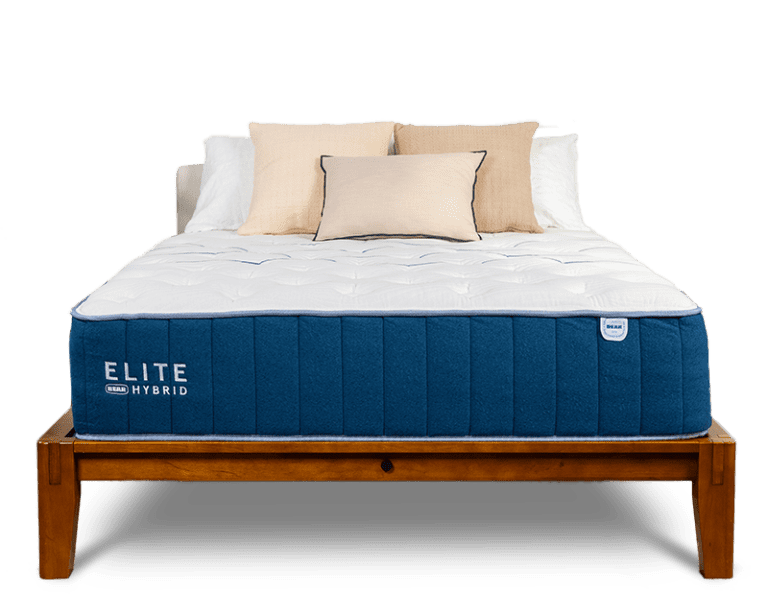
Bear Elite Hybrid
A close-conforming memory foam hybrid offering great pressure relief.
Key Details
- Who It’s Best For: Side and back sleepers across different weight groups, as well as stomach sleepers up to 230 pounds.
- Feel: The surface is somewhat plush, but you’ll notice a strong bounce in response to your movements.
- What It’s Made Of: Comfort layers of copper-infused memory foam and zoned polyfoam over pocketed coils with perimeter reinforcement and targeted midsection support.
- What We Don’t Like: Strong initial off-gassing smells, plus some people over 230 pounds may struggle to move on the two softest designs.
Scoring & Reviews
The following ratings show how suitable this mattress is for different sleeping positions and sleeper weights. These scores are determined by how well the mattress supports and relieves pressure for each sleeper type.
In addition to the hands-on feedback from our team, we conduct a number of quantitative tests in our Test Lab. The below ratings are based on the experience of our testers.
SELECT AN ICON TO VIEW DETAILS:
Motion Isolation
The Bear Elite Hybrid shows considerable ability to prevent vibrations from traveling across the surface of the mattress. Its memory foam layer only reacts where weight is directly applied, which helps keep movement from causing ripple effects that spread to the other side of the bed.However, the bounce of the coils can cause some motion transfer, especially on the firm model that has a reduced amount of contouring.
Pressure Relief
The Bear Elite Hybrid offers excellent pressure relief that stems from its comfort system and the zoned, pocketed coils in its support core. In our testing, it was side and back sleepers who tended to get the best pressure relief and support. That said, stomach sleepers liked the firm (8) model that maintained a flat, stable surface with just enough cushioning for the midsection.
Temperature Control
This mattress doesn’t feel overwhelmingly hot, but it also probably shouldn’t be the top choice for hot sleepers. The copper-infused foam makes it slightly cooler than some other memory foam mattresses, but heat can still collect in and around the foam. The risk of overheating is highest on the Luxury Plush model because it has the closest contouring around the skin, which may make it harder for heat around the body to dissipate during the night.
Edge Support
Reinforced edges in the support core help give this mattress a solid rating for edge support. While you’ll notice foam compression around the perimeter, it’s not so significant that you’ll feel like the mattress is giving out beneath you.Of the three different firmness options, edge support is clearly strongest in the firm (8) model and weakest in the one with a firmness level of medium (5).
Ease of Movement
When you need to switch your sleeping position or adjust your body’s alignment on the mattress, you generally won’t encounter much resistance. Sleepers over 230 pounds may find that there’s less ease of movement, especially on the softer models. But in most cases, the springiness from the thick layer of pocketed coils enables relatively easy movement on the surface of the Bear Elite Hybrid.
Durability
The Bear Elite Hybrid Mattress scores above average for durability thanks to its pocketed coils, reinforced perimeter, and memory foam and polyfoam layers. The mattress comes in three firmness levels, and going firmer will typically extend the life of the mattress a bit more. Overall, you should expect around seven to eight years of use.
Full Breakdown
Bear is an online mattress and bedding brand known for incorporating Celliant fabric in its products, which is designed to regulate temperature. The Bear Elite Hybrid stands out for its balanced construction and sturdy feel. Regardless of their primary sleep position, people of all body types should receive enough cushioning along the spine to alleviate pressure without sinking too much.
How It Performed
The mattress is available in three firmness options that correspond to medium (5), medium firm (6), and firm (8) on our firmness scale. All models have a pocketed coil system that offers robust support. The coils provide sturdy pushback along the perimeter, so anyone who sleeps near the edges of their mattress or struggles getting in and out of bed should feel secure.
Back and side sleepers preferred the medium and medium firm models, while stomach sleepers gravitated toward the firm model for its stronger support.
Construction Breakdown
The Bear Elite Hybrid begins with a layer of copper-infused memory foam under a Euro-top, followed by a polyfoam transitional layer. Celliant and phase change material in the cover are engineered to convert body heat into infrared energy, then transmit this energy back into your body through your skin.
This process is intended to regulate temperature and help with physical recovery during the night, making the Bear Elite Hybrid especially suitable for athletes, generally active individuals, and people with physically demanding jobs.
Best Mattress for Spinal Alignment
9.0/10Test Lab Score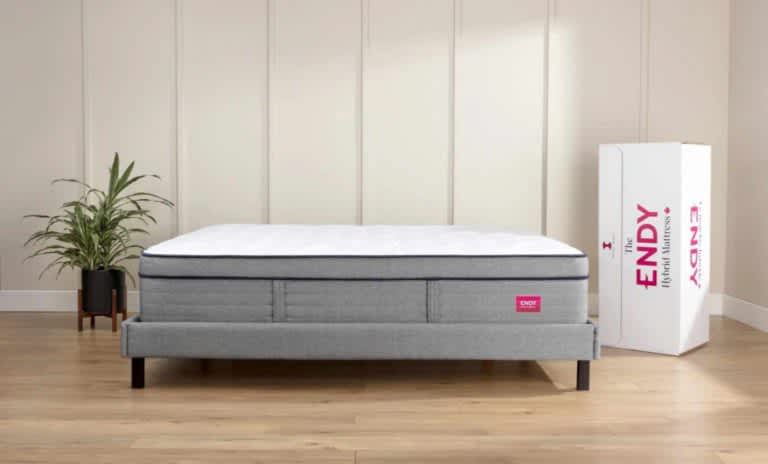
Endy Hybrid
An adaptive foam hybrid available in three firmness levels.
Key Details
- Who It’s Best For: Side and back sleepers across most weight groups, hot sleepers, and people with shoulder, lower back, or hip pain.
- Feel: Available in medium soft (4), medium firm (6), and firm designs (7) – all of which feel adaptive on the surface with strong underlying support.
- What It’s Made Of: A comfort layer of adaptive, open-cell polyfoam, followed by transitional foam and zoned pocketed coils.
- What We Don’t Like: Firmer models may be too responsive for couples.
Scoring & Reviews
The following ratings show how suitable this mattress is for different sleeping positions and sleeper weights. These scores are determined by how well the mattress supports and relieves pressure for each sleeper type.
In addition to the hands-on feedback from our team, we conduct a number of quantitative tests in our Test Lab. The below ratings are based on the experience of our testers.
SELECT AN ICON TO VIEW DETAILS:
Motion Isolation
The medium soft version of the Endy Hybrid excels at absorbing movement and preventing motion from transferring across the mattress surface. This makes the mattress a solid pick for sleep partners who tend to disrupt each other during the night with position changes and trips to the bathroom. The medium firm and firm models also isolate motion reasonably well, but couples will likely notice more motion transfer due to the stronger bounce.
Pressure Relief
Pressure relief is one of the Endy Hybrid’s defining strengths. The medium soft model hugs the body closely to cushion sensitive areas around the spine and promote even alignment, while the medium firm and firm models conform to a moderate extent and won’t sink as much beneath a sleeper’s weight. Each can provide great pressure relief, albeit for people in different weight and sleep position groups.
Temperature Control
Open-cell foam layers make up the Endy Hybrid’s comfort system. This material is designed with pockets of air and engineered to promote circulation to minimize heat retention. That said, our testing team found that the medium firm Endy Hybrid sleeps noticeably cooler than the medium soft model – this can be attributed to the latter’s deeper hug, which restricts airflow and can cause overheating.
Edge Support
All three versions of the Endy Hybrid feature reinforced perimeter coils to protect the edges from deep sinkage when you lie along the outer area of the mattress or get in and out of bed. However, the medium soft model still compresses quite a lot when weight is applied. The medium firm and firm Endy Hybrid models also sink a bit, but not to the same extent as its softer counterpart.
Ease of Movement
Due to its thick foam layers, the Endy Hybrid may be difficult to move on and make you feel “trapped” or “stuck” when you change sleep positions or get on and off the mattress. The medium soft model is especially prone to deep sinkage, but none of the three models are particularly responsive.
Durability
All three versions of the Endy Hybrid are about average in terms of expected durability, with the firm model having a slight edge because it doesn’t compress as much as the other two and its foam layers won’t develop deep indentations as quickly. However, those seeking an ultra-durable mattress may want to look elsewhere, as most foam hybrids – even many firmer models – are not known for their lengthy lifespans.
Full Breakdown
Proper alignment is crucial to preventing pressure buildup along the spine and getting a comfortable night’s sleep – and some mattresses promote alignment better than others. The Endy Hybrid contains a surface layer made of adaptive, open-cell polyfoam that contours to your body and keeps your spine aligned, followed by transitional foam and zoned coils for targeted lower back support. Three firmness options and a generous trial-and-return policy further sweeten the deal if you aren’t sure which firmness level best meets your needs.
How It Performed
Side sleepers on our testing team who weigh less than 130 pounds were impressed with the medium soft (4) Endy Hybrid, which conforms closely and forms a deep cradle for the entire body. Most of our side sleepers who weigh more needed extra support, so they preferred the medium firm (6) and firm (7) designs. Back sleepers up to 230 pounds also liked these models. Stomach sleepers up to 230 pounds may find the firm Endy Hybrid comfortable, but our tests show most people who favor the stomach position will probably find the other models too soft.
Temperature control is a shared strength of all three designs. Breathable open-cell foam and coils that promote internal airflow help the mattress stay cool inside and out. Pressure relief is another area where these mattresses performed well, especially the medium soft and medium firm models.
Construction Breakdown
The topmost layer of the Endy Hybrid consists of adaptive polyfoam engineered to conform closely without hugging too tight. This foam has an open-cell composition, meaning it promotes air circulation well and shouldn’t retain excess heat. A transitional layer of medium-density polyfoam provides extra cushioning while serving as a buffer between your body and the support core, which contains pocketed coils with zoning to provide extra lumbar support and a reinforced perimeter to prevent compression along the edges.
One important thing to note about this mattress is that each firmness level has a different height, ranging from 9 inches for the firm model to 11 inches for the medium soft model. Thickness also affects the sticker price, so the medium soft Endy Hybrid costs a bit more than the other two. A stretch-knit polyester cover encases the entire mattress.
Best Luxury Mattress
9.2/10Test Lab Score
Saatva HD
A high-end innerspring mattress with an emphasis on craftsmanship.
Key Details
- Who It’s Best For: People who weigh more than 230 pounds, especially side and back sleepers.
- Feel: A balance of cushioning and bounce with extra pushback around your torso and hips.
- What It’s Made Of: Zoned latex and gel-infused memory foam comfort layers, followed by a support core with thick innerspring coils.
- What We Don’t Like: As a luxury model, the Saatva HD is fairly expensive, and the mattress produces a fair amount of motion transfer.What We Don’t Like: As a luxury model, the Saatva HD is fairly expensive, and the mattress produces a fair amount of motion transfer.
Scoring & Reviews
The following ratings show how suitable this mattress is for different sleeping positions and sleeper weights. These scores are determined by how well the mattress supports and relieves pressure for each sleeper type.
In addition to the hands-on feedback from our team, we conduct a number of quantitative tests in our Test Lab. The below ratings are based on the experience of our testers.
SELECT AN ICON TO VIEW DETAILS:
Motion Isolation
Motion isolation on the Saatva HD is only around average. Its firmness and bounce reduce its ability to keep vibrations from traveling across the mattress surface.While you can detect movement when a bed partner gets in or out of bed, it’s not enough to bother most people. It is mostly a concern for anyone who sleeps lightly and can be easily awoken.
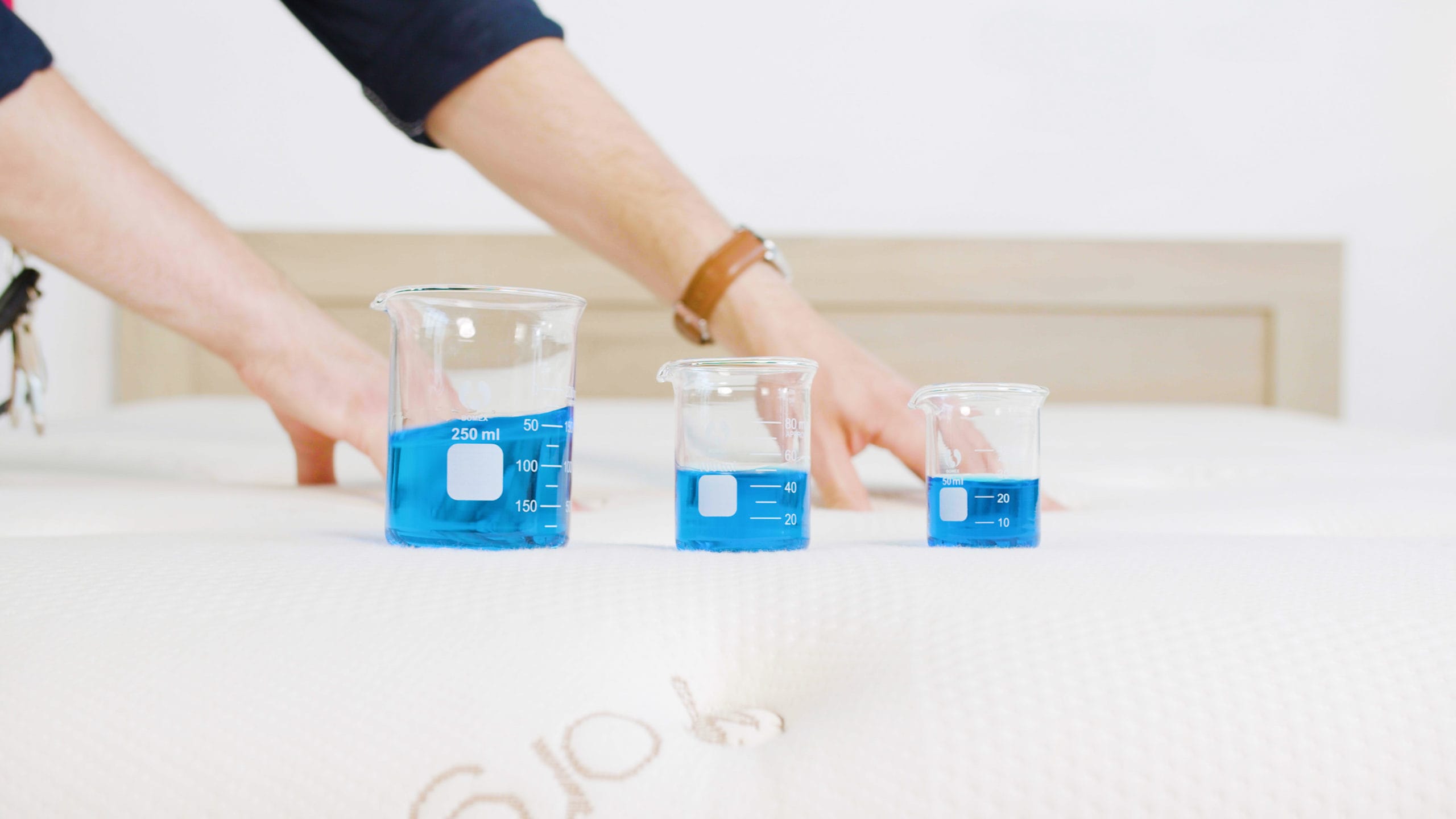
Pressure Relief
The Saatva HD provides average to above-average pressure relief to most sleepers. In our testing, it was most supportive for people over 230 pounds who can benefit from its balanced feel without excessive sinkage. Its firmness and zoned design also made it a good option to relieve pressure for people who sleep on their back or stomach.
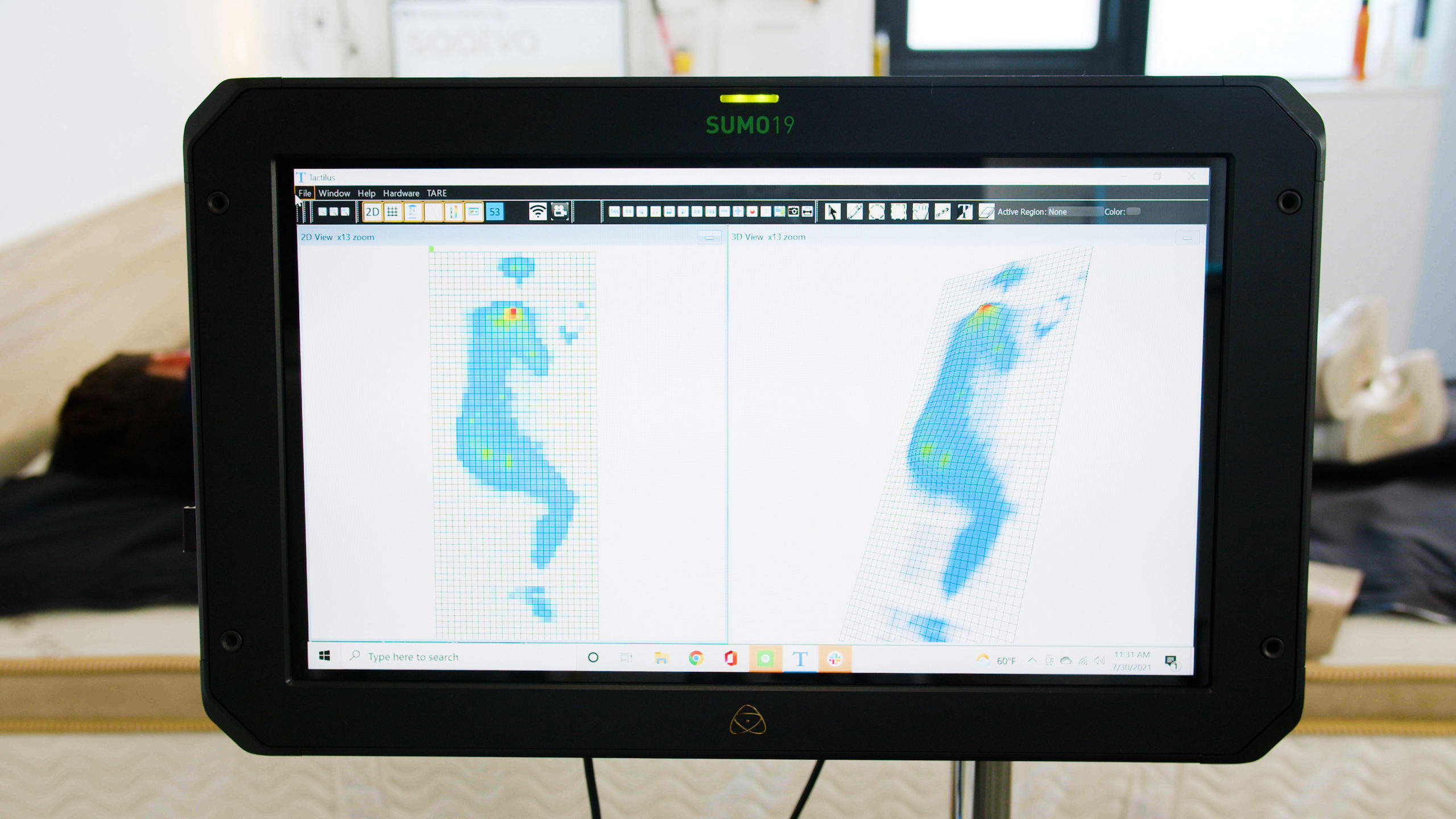
Temperature Control
The Saatva HD has excellent temperature regulation. It stays cool thanks to the layers of cotton, latex, and innerspring coils. Cotton is naturally breathable, and latex retains minimal heat. Air can flow through the coils so that warmth doesn’t build up in the support core.All of these elements make the Saatva HD compelling for hot sleepers, especially those who have a higher body weight.
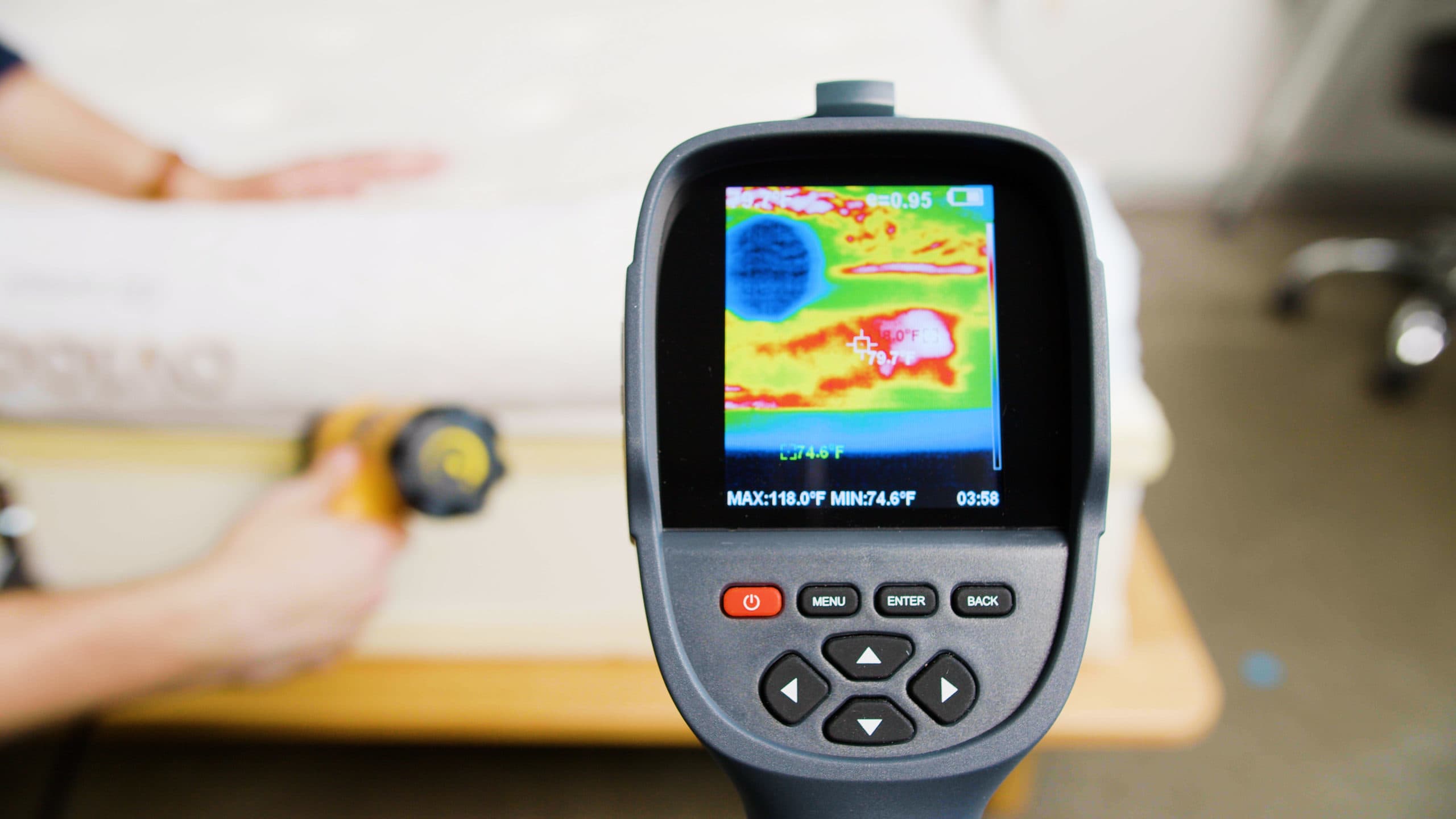
Edge Support
Multiple components contribute to above-average edge support on the Saatva HD. Extra-thick coils with a high-density polyfoam encasement create a sturdy base around the perimeter. The responsive and firm latex also holds up well around the edges.This strong edge support is a refreshing change of pace for sleepers over 230 pounds who often find mattresses to be too soft around the perimeter.
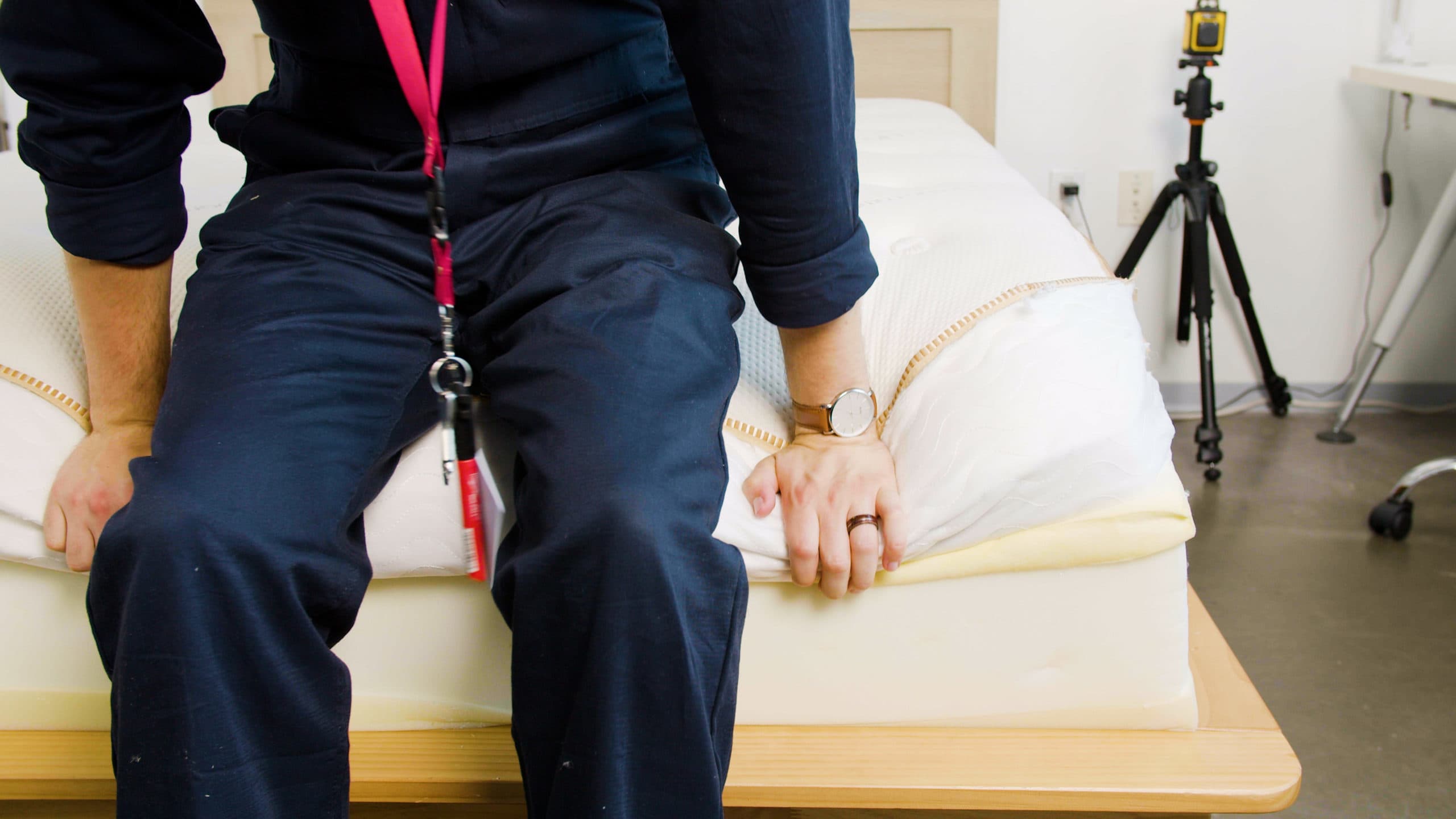
Ease of Movement
The Saatva HD’s bounce makes ease of movement a strength of this mattress. Both latex and coil layers create a springiness that lets you easily turn over or switch your sleeping position.
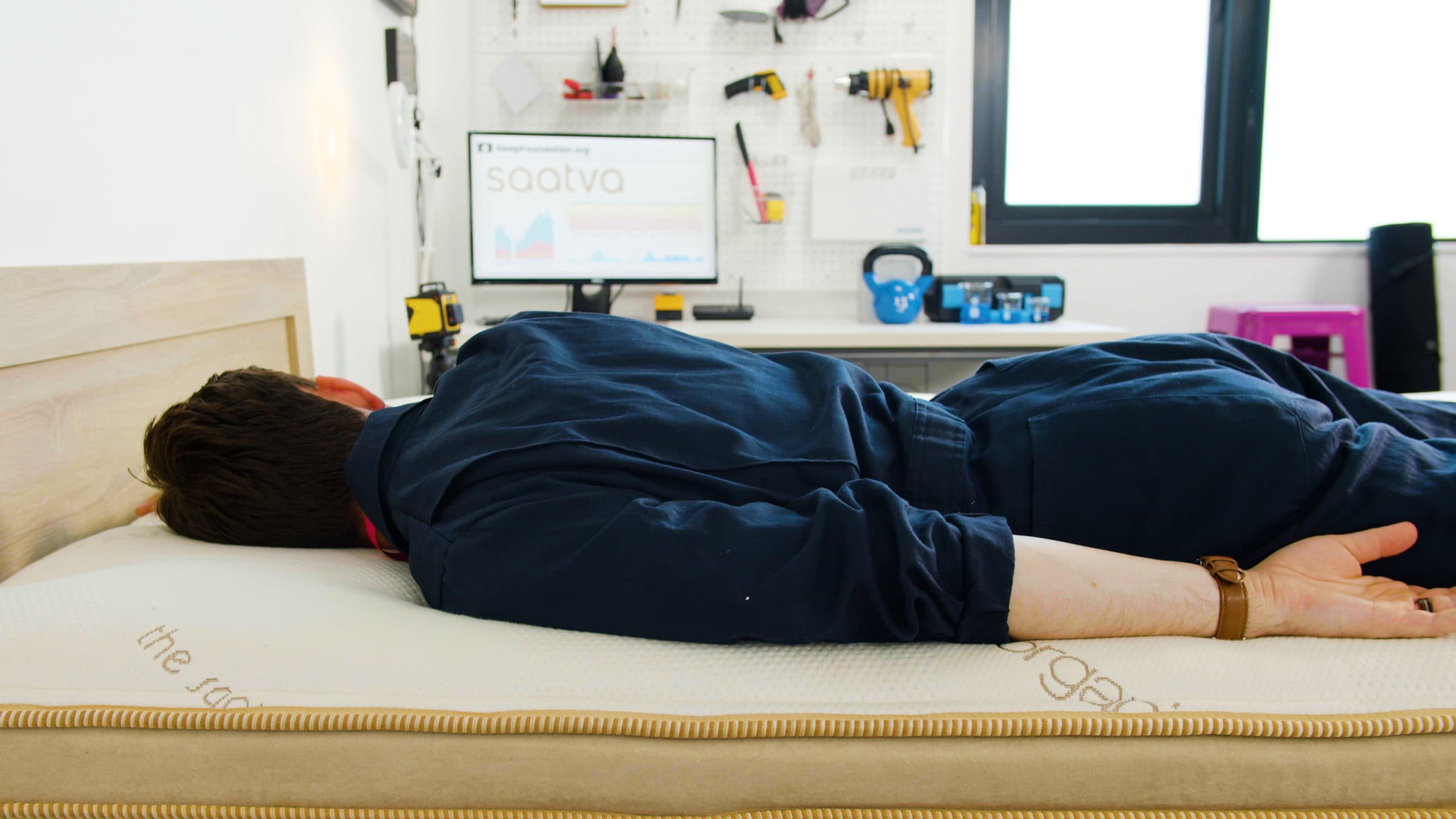
Durability
The Saatva HD mattress is likely to last close to 10 years thanks to its multiple layers of polyfoam, latex, and innerspring coils. As a hybrid, it’s a step above all-foam models. But Saatva went with more durable materials for this mattress, which is marketed to heavier people. Specifically, its 14-gauge tempered steel coils that are 25% stronger than industry standard and the latex and polyfoam components in the comfort layer, which add durability.
Full Breakdown
The Saatva HD is one of the few luxury mattresses sold today that was specifically created for people who weigh more than 230 pounds. High-quality materials and excellent craftsmanship elevate the HD over traditional innersprings, but sleepers can still enjoy the sturdy support and signature bounce that have come to define this type of mattress.
How It Performed
As confirmed by our testers, the HD performs well among its target audience. Side sleepers weighing more than 230 pounds enjoyed the moderate cushioning of the top foam layer, which prevented pressure buildup in the shoulders and hips without contouring too closely.
Our back and stomach sleepers in the same weight range experienced little to no sinkage thanks to the zoned latex and thick, low-gauge offset coils.
We noticed minimal compression during our edge support tests, and all of us were able to scoot across the mattress with relative ease. Temperature control was another testing highlight. The ventilated latex and coil system promote plenty of airflow, so the HD consistently maintains a comfortable temperature, while the breathable cover helps the surface stay cool.
Construction Breakdown
The Saatva HD begins with Talalay latex encased in a luxurious Euro-top. This layer is divided into five firmness zones, pushing back against the extra weight in your midsection without feeling overly firm beneath your head and legs.
The next layer consists of gel-infused memory foam. This layer conforms somewhat to the body, but a dense composition prevents the close “hug” many people notice on softer foam mattresses. Transitional polyfoam serves as a buffer between your body and the support core.
Foam-encased offset coils deliver excellent reinforcement and stability to the entire mattress. The coils have a gauge of 12.5, making them very thick compared to those found in other innersprings, so you should expect significant bounce from this mattress. High-density base foam completes the support system, and an organic cotton cover encases the mattress.
Best Extra-Firm Mattress
8.4/10Test Lab Score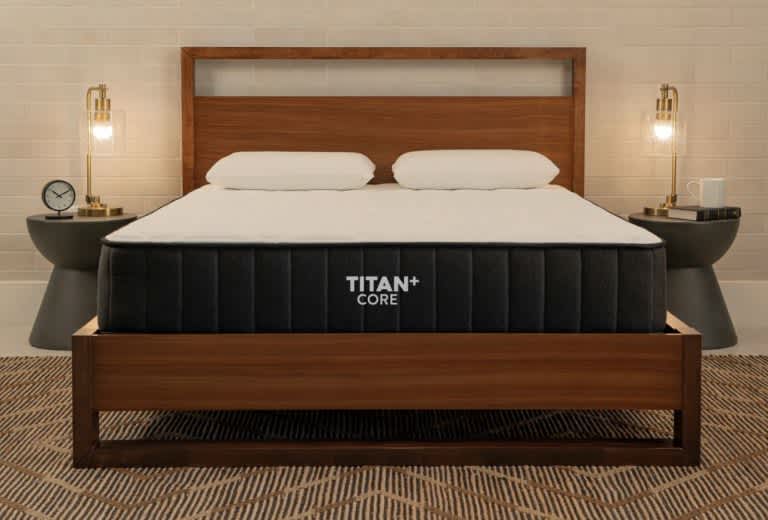
Titan Plus Core
A firm hybrid that provides excellent support for heavier people.
Key Details
- Who It’s Best For: People over 230 pounds, especially back and stomach sleepers.
- Feel: Dense surface with minimal contouring and a strong bounce when you change sleep positions.
- What It’s Made Of: Gel-infused memory foam and latex-like polyfoam comfort layers over thick pocketed coils.
- What We Don’t Like: Potentially too firm for some side sleepers over 230 pounds.
Scoring & Reviews
The following ratings show how suitable this mattress is for different sleeping positions and sleeper weights. These scores are determined by how well the mattress supports and relieves pressure for each sleeper type.
In addition to the hands-on feedback from our team, we conduct a number of quantitative tests in our Test Lab. The below ratings are based on the experience of our testers.
SELECT AN ICON TO VIEW DETAILS:
Motion Isolation
Beds with good motion isolation help keep movement on one side of the bed from disturbing the sleeper on the opposite side. Our team found that the Titan Plus Core had very good motion isolation due to the pocketed coil design.Traditional coil beds generally have poor motion isolation. The Titan Plus Core’s pocketed coils, which are wrapped in fabric, can be compressed individually without affecting the surrounding coils. This results in good motion isolation on the surface.
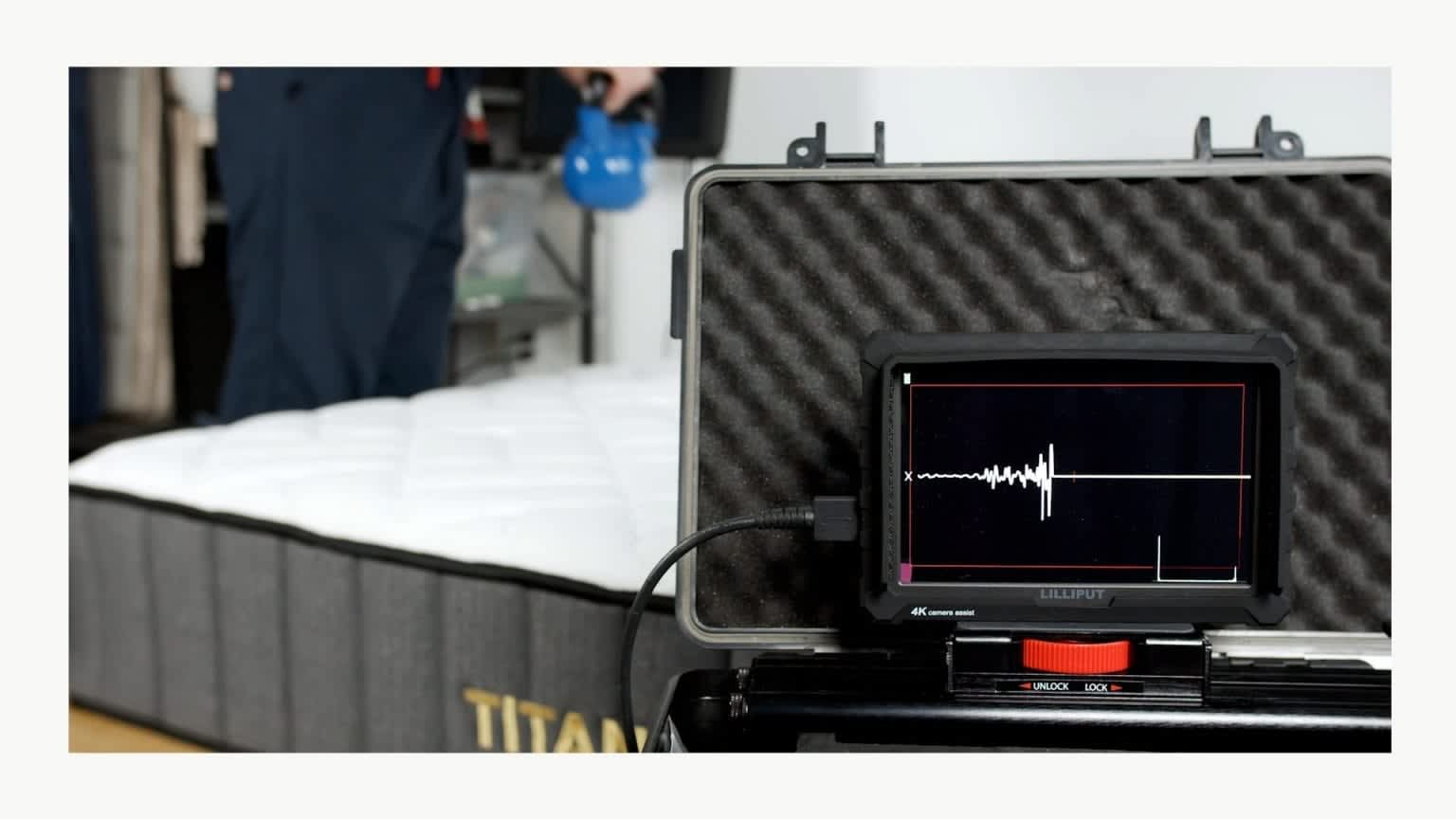
Pressure Relief
In our tests, the Titan Plus Core offered good pressure relief for most sleepers, and particularly for heavier people. However, lighter sleepers will likely find that the mattress feels too firm. Remember that this is a firm bed, with a relatively thin comfort layer. This means that conforming is minimal, and the mattress material doesn’t “hug” the body. For those used to an all-foam mattress, the Titan Plus can feel a lot different in terms of pressure relief.
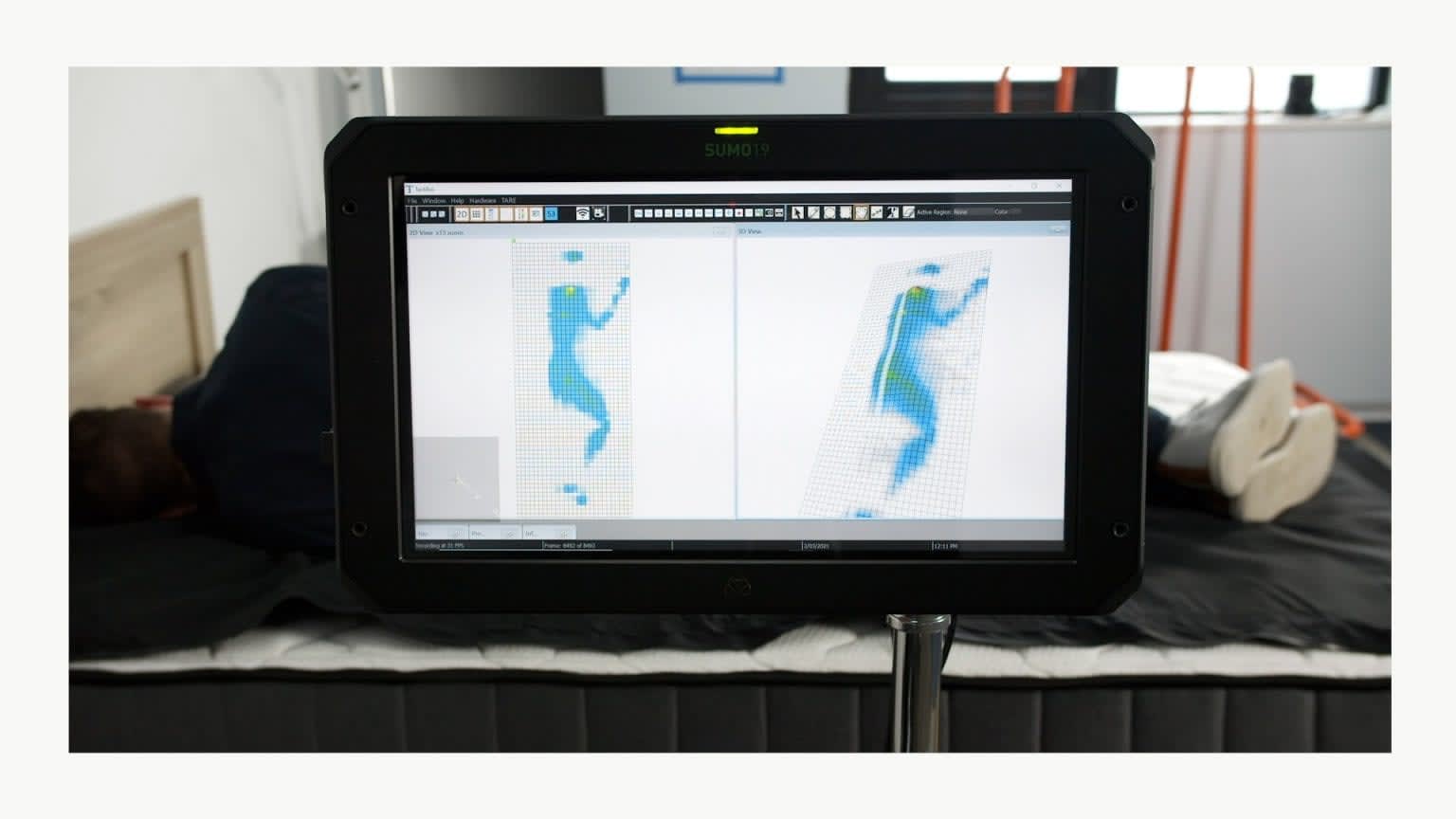
Temperature Control
The Titan Plus Core performed very well during temperature control tests. Its coils promote airflow, helping the bed stay cool. Gel-infused memory foam in the top comfort layer also helps to draw heat away from the body.We found that the base model of the Titan Plus did a good job of maintaining a comfortable sleeping temperature. For those who tend to sleep hot, the optional cooling cover may be a worthwhile addition.
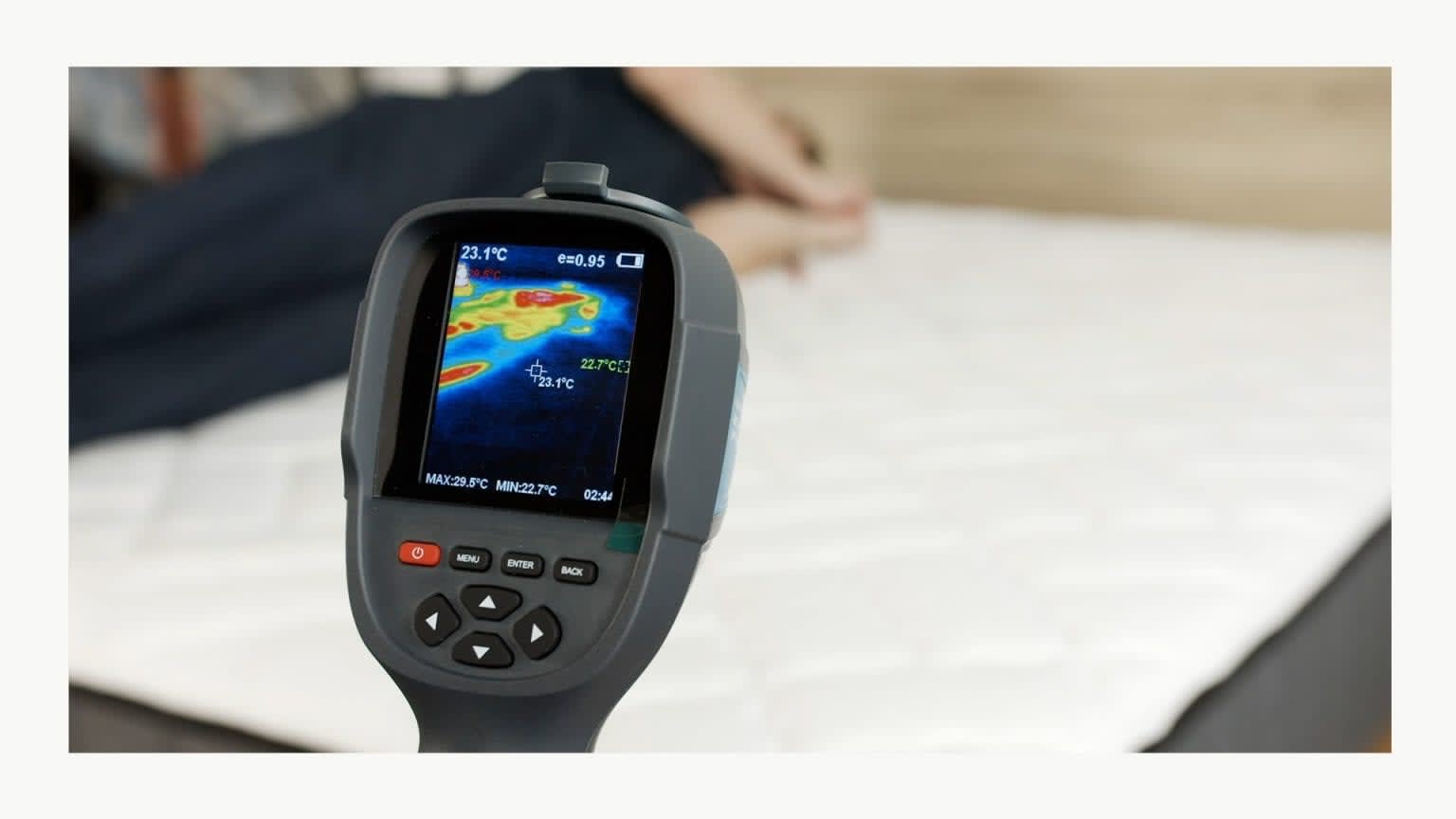
Edge Support
Edge support is a measure of how supportive a mattress feels around its outer perimeter. This is an important factor for those who like to sit at the edge of the mattress, as well as for people who have difficulty getting in and out of bed.The Titan Plus Core has excellent edge support overall. Its thick coil system, combined with firm foam layers, means it provides edge support that is significantly better than average.
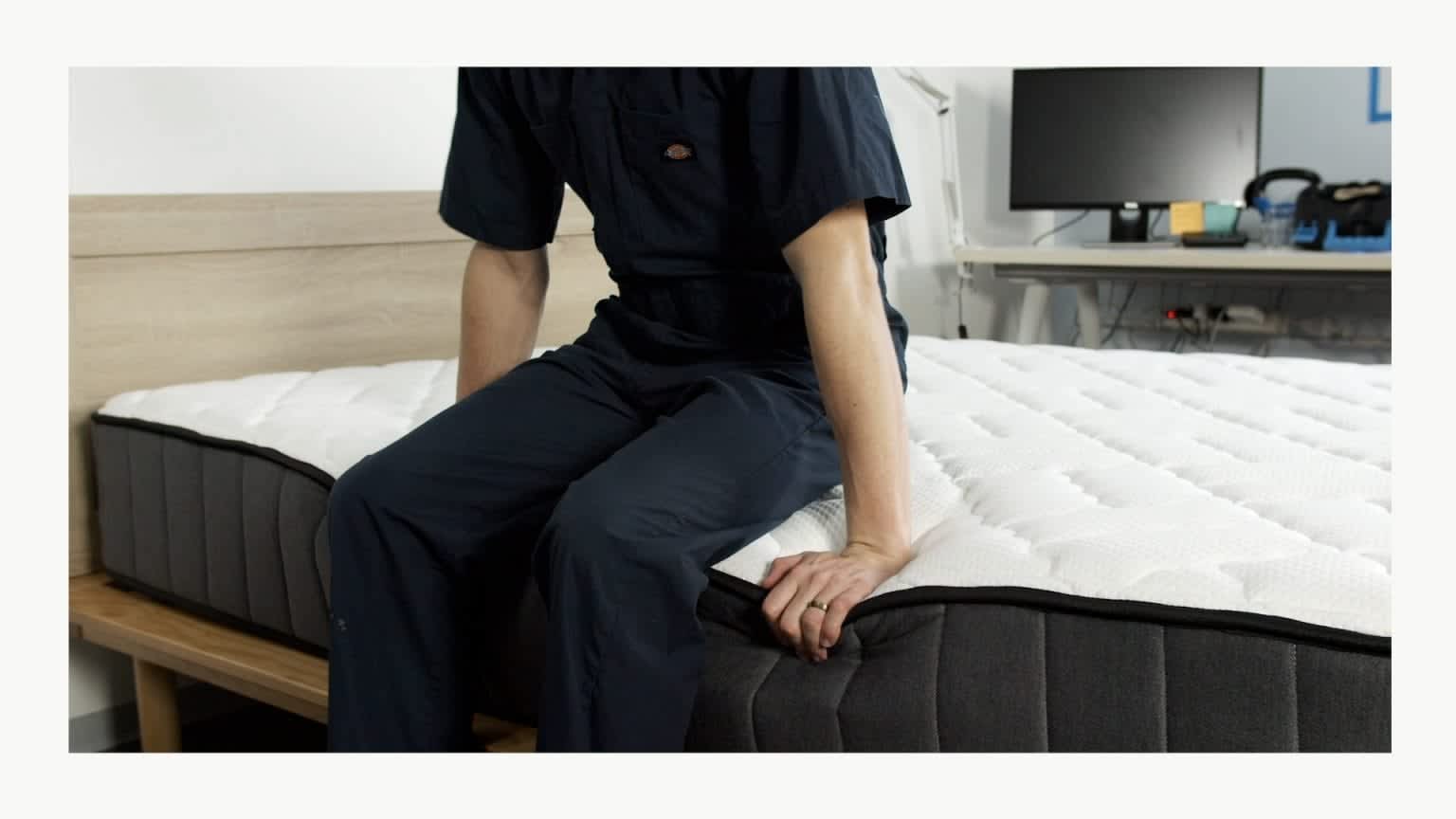
Ease of Movement
In our tests, the Titan Plus Core had very good ease of movement. This is due to the bed’s firm design and minimal “sinkage”. Unlike softer all-foam mattresses, sleepers won’t sink into the bed. This makes it significantly easier to change positions and get in and out of bed.

Durability
The Titan Plus Core is one of the firmest and more supportive mattresses on the market. Not surprisingly, this design is also quite durable and resistant to wear and tear over time. Dense foam layers in the comfort system contour lightly, so they shouldn’t develop impressions or indentations too quickly, and the coils are robust for long-lasting stability. Expect a lifespan of at leat 8 to 9 years, which is longer than average for a foam hybrid.
Full Breakdown
Many mattresses sold today are suitable for people weighing more than 230 pounds, but the Titan Plus Core by Brooklyn Bedding is specifically designed for this sleeper demographic. A firm (8) model, our tests showed the Plus Core contours very little and maintains a flat, even sleep surface even for heavier individuals.
How It Performed
Our testers were divided about the Titan Plus Core, but it was a big hit among those weighing more than 230 pounds. The mattress received stellar ratings from all of our testers in this weight range across the side, back, stomach, and combination sleeping groups.
As an exceptionally firm mattress, the Plus performed well in some areas where softer hybrids tend to struggle. We noticed little to no sinkage while testing the mattress for edge support by lying along the perimeter and mimicking the movements of getting in and out of bed.
Ease of movement was another strong point, as none of our testers felt “stuck” moving across the surface. During the temperature control tests, our thermal sensors detected minimal heat buildup — we attribute this to the cooling cotton-knit cover and steady airflow through the coils.
Construction Breakdown
The Plus Core’s comfort system consists of two layers. Adaptive, gel-infused memory foam is sewn into the bottom of the cover to give the surface some gentle cushioning. The second layer is responsive, latex-like TitanFlex polyfoam that supports the spine and produces a light bounce when you get into bed. The support core contains pocketed coils over high-density base foam. Altogether, the Plus measures 12 inches thick.
A cotton-knit cover encases the mattress. While this breathable material helps promote air circulation, some may still notice heat retention in the foam layers. These sleepers are good candidates for the GlacioTex cover, which contains a phase change panel engineered to dissipate heat on contact and maintain a cool-to-the-touch feel. Adding the GlacioTex will increase the sticker price by $100 to $200, depending on your chosen size.
Our Approach to Weight and Mattress Needs
Before we dive into how you should think about buying a bed for a bigger body, I want to clarify how we talk about body weight. For the purposes of this page, I’m talking about mattresses for people who weigh 230 pounds or more. Why 230 pounds? Most mattresses are designed for people up to 250 pounds, but heavier people sink deeper into a mattress and thus need extra support to maintain healthy spinal alignment.
But I’m under no illusions that this number is perfectly representative. I use the term “heavy” for brevity and convenience, not because there’s a universal definition or cut-off. And ultimately, I find terms like “average weight” or “overweight” more subjective and potentially misleading (over what weight?).
What’s important isn’t a number on a scale; it’s helping people get the best sleep they can. And I hope this guide proves useful to people who might otherwise find it challenging to find a high-quality mattress that suits their needs.
Video: We Tested the Best Mattress for Heavy People – Here Are Our Favorites
Watch our video below to learn more about our lab’s top mattress picks for heavy people.
What to Consider When Shopping for a Mattress for Heavy People
Like anyone, heavy people need a mattress that provides dependable comfort and support. Your mattress should feel sturdy enough to hold your spine in a neutral position and, at the same time, have enough cushioning to feel comfortable and inviting.
It’s easy to assume that the heavier you are, the softer and thicker the layers of your mattress should be. But I’ve learned that’s not exactly true. While thicker layers can be more supportive, mattresses that are too plush can make you feel like you’re sinking into quicksand.
That’s why I’m always in search of balance. The mattresses that our testing team have rated the highest have thoughtful designs, quality materials, and strong all-around performance.
That said, we’re all unique. My perfect mattress might feel terrible to you (and vice versa). That’s why I want to take the time to go over the main things to think about when you’re shopping for a mattress, so you can determine what’s best for your sleep.
Your Sleep Position
Your sleep position determines how your weight is distributed. If you’re a side sleeper (like me), your hips and shoulders may dig into the mattress. Or if you’re on your back or stomach, you may feel tension around your lumbar spine if you don’t get proper support.
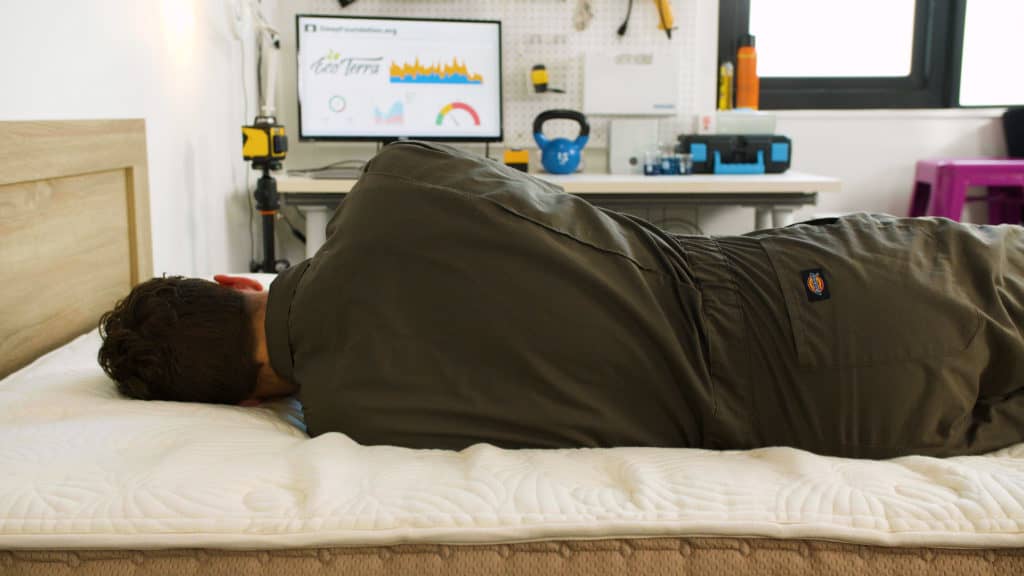
So what does that mean in terms of choosing a mattress? It starts with getting the firmness level dialed in. Your mattress should provide the right amount of cushioning for your pressure points, but it also needs to resist sinking and sagging.
If you aren’t sure what firmness level you need, our testing team put together firmness recommendations for heavy people based on sleeping position, using data from thousands of hours of mattress testing. Keep in mind, these recommendations may not work for everyone, since comfort is inherently subjective.
| Sleeping Position | Recommended Firmness Level |
|---|---|
| Side | Medium Firm (6) to Firm (7 or 8) |
| Back | Firm (7 or 8) to Extra Firm (9) |
| Stomach | Firm (8) to Extra Firm (9) |
How Much of a ‘Hug’ You Want
Before I joined the testing team, I assumed the most comfortable mattress would be plush and closely contour around my body. From experience, though, I discovered that, while I love a good bear hug from my wife or best friend, I didn’t want one from my mattress.
Some contouring can help cushion your pressure points so you don’t wake up stiff and sore. But too much hug can jeopardize support. It can also feel hot and stuffy — as a hot sleeper, that’s a dealbreaker for me.
Although personal preferences vary, our testing team has found that a gentler and more moderate amount of hug is best for the majority of people who weigh 230 pounds or more. I suggest looking for a mattress along those lines unless you know from past experience that you prefer something different.
Responsiveness and Edge Support
Do you remember what it was like to play in a ball pit as a kid? It was fun to sink down and then climb your way out. But I’m not a kid anymore, and I don’t want my mattress to feel like a ball pit. In fact, I get downright annoyed when I feel like I have to climb out of my mattress.
That’s the idea of “responsiveness” in a mattress. A highly responsive mattress is the opposite of the ball pit: There’s a bit of pushback when you want to move. The mattress materials spring back quickly, retaking their shape when you move or get out of bed.
For heavier people, having a more responsive mattress can be a major plus. It not only keeps you from being stuck in place but also creates more reliable perimeter support (think: sitting on the edge of your bed).
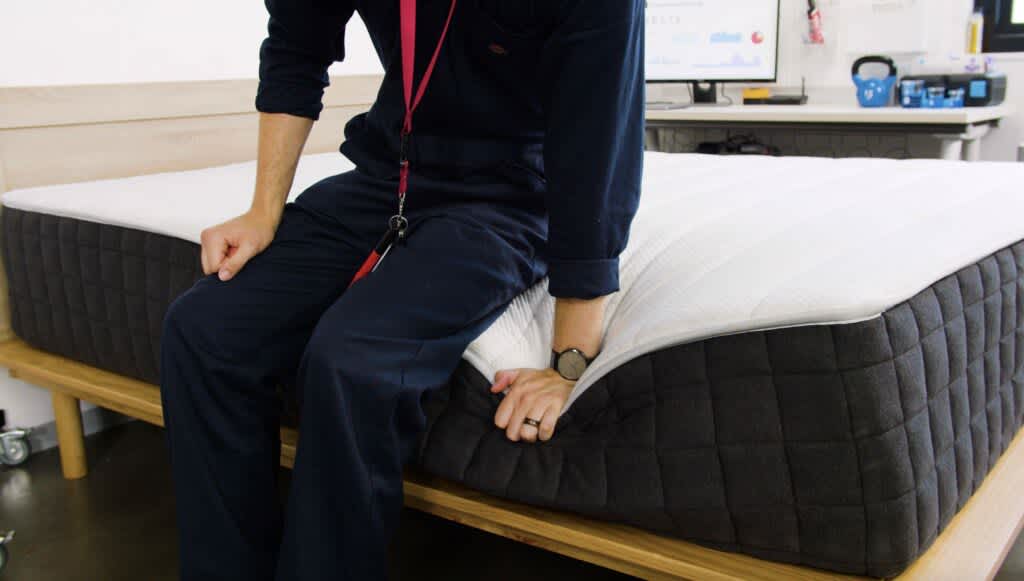
Durability
We all depend on our mattresses night after night, so consistent performance and durability really matter. Through testing hundreds of beds over the years, I’ve seen firsthand how certain mattresses hold up better than others, especially when they’re built to support larger bodies.
The truth is, every mattress will wear out eventually, no matter who’s sleeping on it. But if you’re putting extra pressure on your bed, choosing a sturdier, well-constructed model can add years to its lifespan. And while these mattresses might come with a higher price tag upfront, they often pay off by holding their shape and support much longer than flimsier options.
Sleeping With a Partner
Finding the right mattress to share with a partner isn’t just about body weight — it also comes down to your individual sleep positions, firmness preferences, and comfort needs. Sometimes you’ll get lucky and find a middle ground that works well for both of you. Other times, compromise might not cut it.
If your preferences are too different, one solution is to look for a mattress with dual firmness options, where each side of the bed offers a different feel. These setups can be pricier and limit your choices, but they’re a great way to make sure everyone sleeps comfortably.
At the end of the day, picking a mattress as a couple is all about making sure both people get the rest they need. Whether that means finding a shared solution, opting for split firmness, or adding a topper to one side, the goal is the same: better sleep for both of you.
Sleep Temperature
Some people seem to always run hot, including at night. With the wrong mattress, that can mean constant sleep disruptions, waking up sweating bullets and kicking off blankets. If you sleep hot like me, look for a mattress with materials that resist heat buildup.
From my experience and our in-house testing, that usually means a latex mattress or one with metal coils or springs. As for mattress covers, several types of materials, such as cotton, Tencel, and viscose derived from bamboo, offer breathability that can help combat sleeping hot.
You can also choose a mattress with cooling features, like gel or copper infusions or phase change materials, designed to dissipate extra heat so that it doesn’t build up around your body while you sleep.
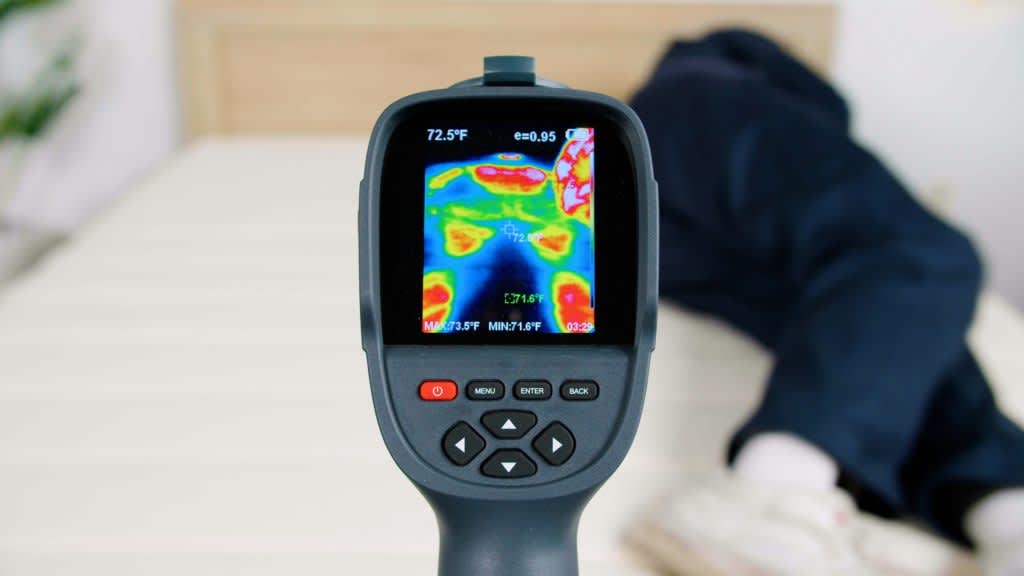
What Mattress Types Are Best for Heavy People?
Mattress shopping has always been a bit overwhelming, but it can feel even tougher today with the growing number of brands and models. If you’re on the heavy side, options are more plentiful than they once were, but it may be helpful to start by focusing on a few mattress types that are more likely to meet your needs.
Hybrid
Hybrids are built with a base of bouncy innerspring coils and top layers of pressure-relieving materials like foam and latex. I’ve found that most hybrids strike a good balance of cushioning and sturdiness. That lets me sleep comfortably without worrying about excess sinkage.
When shopping for hybrids, though, it’s important to look closely at how they’re built. Some are too soft or conforming for heavy sleepers.
Latex
Latex is a robust and durable material that lightly embraces the body but doesn’t have a deep hug. It’s bouncy and doesn’t trap heat like some other materials. With these characteristics, latex mattresses regularly get high ratings during our tests from people over 230 pounds.
Airbed
Airbeds let you adjust the firmness of your mattress with the touch of a button. For heavy people, this offers the utmost flexibility in finding a comfortable and supportive feel. Plus, most airbeds are designed so that you can set different firmness levels on each side, making them great for couples who don’t share the same comfort preferences.
What Mattress Types Are Less Than Ideal for Heavy People?
Certain types of mattress construction tend to pose problems for heavier people. If you see one of these models, it’s not a full-on dealbreaker, but it’s best to proceed with caution.
Memory Foam
Memory foam hugs the body, which can feel overly soft and stuffy to some heavier people. Significant sinkage can reduce back support and spinal alignment. Plus, memory foam mattresses can also trap heat and feel especially weak around the edge.
Innerspring
Traditional innersprings feel firm, but that’s because they have almost no cushioning for your joints and pressure points. They also have some of the worst durability ratings, and their already short lifespan may be even shorter for heavier people.
Low-Profile Mattresses
Although this rule isn’t set in stone, I typically advise people over 230 pounds to avoid mattresses that are under 8 inches tall. With such a low profile, these mattresses often have layers that are too thin to provide reliable cushioning, support, and comfort.
Sleep Tips for Heavy People
Over the years of testing mattresses and diving deep into the world of sleep health, I’ve picked up a few tips that might be helpful for you, too.
First: I’m a big fan of adjustable bed frames. Being able to raise either the head or foot of the bed makes a surprising difference in comfort — especially if you deal with snoring, breathing issues, or just like reading in bed. As our sleep expert Dr. Adavadkar points out, elevating the head can help reduce snoring and ease certain breathing difficulties, making adjustable beds a smart option for many people.
Second: Don’t underestimate the power of good pillows. Life is too short for flat, unsupportive pillows. The right pillow can do wonders for your neck and spinal alignment. I also recommend having an extra pillow (or a body pillow) on hand to support your lower back or knees if needed.
And finally: If you’re struggling with persistent sleep issues — like regular daytime drowsiness, loud snoring, or difficulty staying asleep — don’t chalk it up to stress or try to power through it with caffeine. Talk to your doctor. Sometimes these symptoms point to a sleep disorder like sleep apnea, and getting the right diagnosis can be life-changing.
What I’m Sleeping On
My wife and I sleep on the Brooklyn Bedding Bloom. We’ve been very happy with this latex-hybrid model, but sadly, the company no longer sells it. So we’re shopping for a new mattress and leaning toward another one from Brooklyn Bedding (possibly even the Aurora Luxe, which we ranked well for hot sleepers above).
Not only have we appreciated the Bloom’s performance over the last 7 years (it’s lasted through four different cats and a 150-pound dog!), but most of Brooklyn’s current mattresses are available in different firmness levels — including options for someone like me who needs extra support.
How We Test: Your Comfort Is Our Science
Our industry-leading product testing team takes sleep seriously. We strongly believe that better sleep can be transformative, and we see it as our responsibility to help guide you to mattresses and other sleep products that can help you get better rest.
In our Seattle-based Test Lab, we use a hands-on method to evaluate mattresses. We’ve been using and refining this process for nearly a decade, testing nearly 2,000 mattresses in the process. Our mattress breakdowns are based on a few different steps.
Construction analysis: We start by taking a close look at details of how each mattress is made, including the materials and height of each layer and the overall mattress firmness.
Product testing: Direct testing is crucial to our ratings. We take advantage of technological tools to measure things like heat buildup, motion transfer, and pressure relief. Feedback from our testers who weigh more than 230 pounds was key to narrowing down our top picks for this list.
Field testing: Each mattress goes home with a member of our testing team. Their feedback gives us a more well-rounded perspective on how a mattress performs night after night.
User testing: We curate feedback that verified owners have provided in surveys and product reviews. This provides context for the rest of our findings, allowing us to tweak our ratings if necessary to reflect real-world experiences.
How We Determine Our Overall Scores
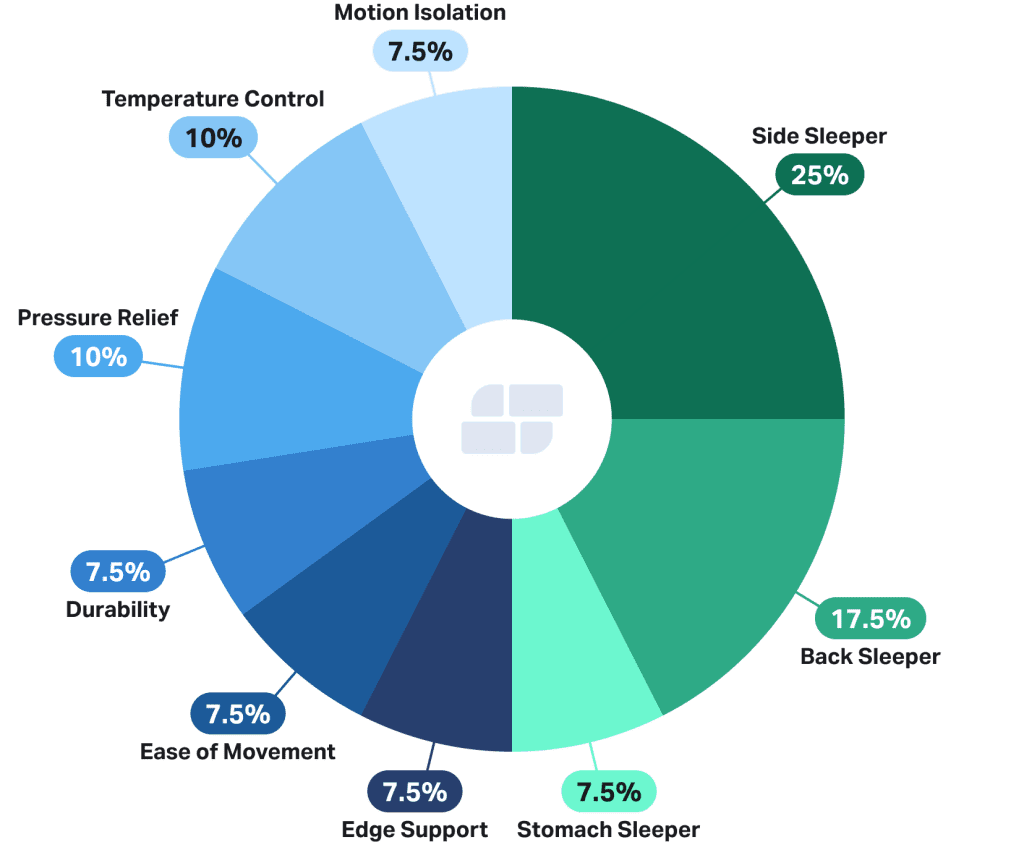
To determine a mattress’s overall score, we assign weighted percentages to different performance categories. We give more weight to the categories with a bigger impact on sleep satisfaction.
Performance Categories
Motion Isolation
Motion isolation describes how well a mattress prevents you from feeling vibrations when there is movement on another part of the mattress. Hands-on testing with a vibrometer allows us to see how well a mattress isolates motion.
Temperature Control
To determine how well a mattress regulates temperature, we use heat mapping technology and look closely at the materials in each layer of the mattress design.
Pressure Relief
Specific pressure mapping equipment lets us see how much pressure builds up around the joints and other pain points when a person is lying on a mattress. We evaluate pressure relief for people of different body weights and in different sleeping positions.
Ease of Movement
This reflects how easily a sleeper can move across a bed’s surface, which is important for people with mobility issues. Responsive or bouncy surfaces (such as latex) typically perform better than foam surfaces, which can inhibit movement.
Edge Support
To rate edge support, we perform tests along a bed’s perimeter to measure how well the edges push back against weight when sitting and lying down. Mattresses with strong edge support have minimal sagging close to the perimeter.
Durability
To rate durability, we evaluate the mattress’s materials, construction, and design features to estimate how well it will resist wear over time. Our scores reflect known performance patterns of foams, latex, coils, and other components.
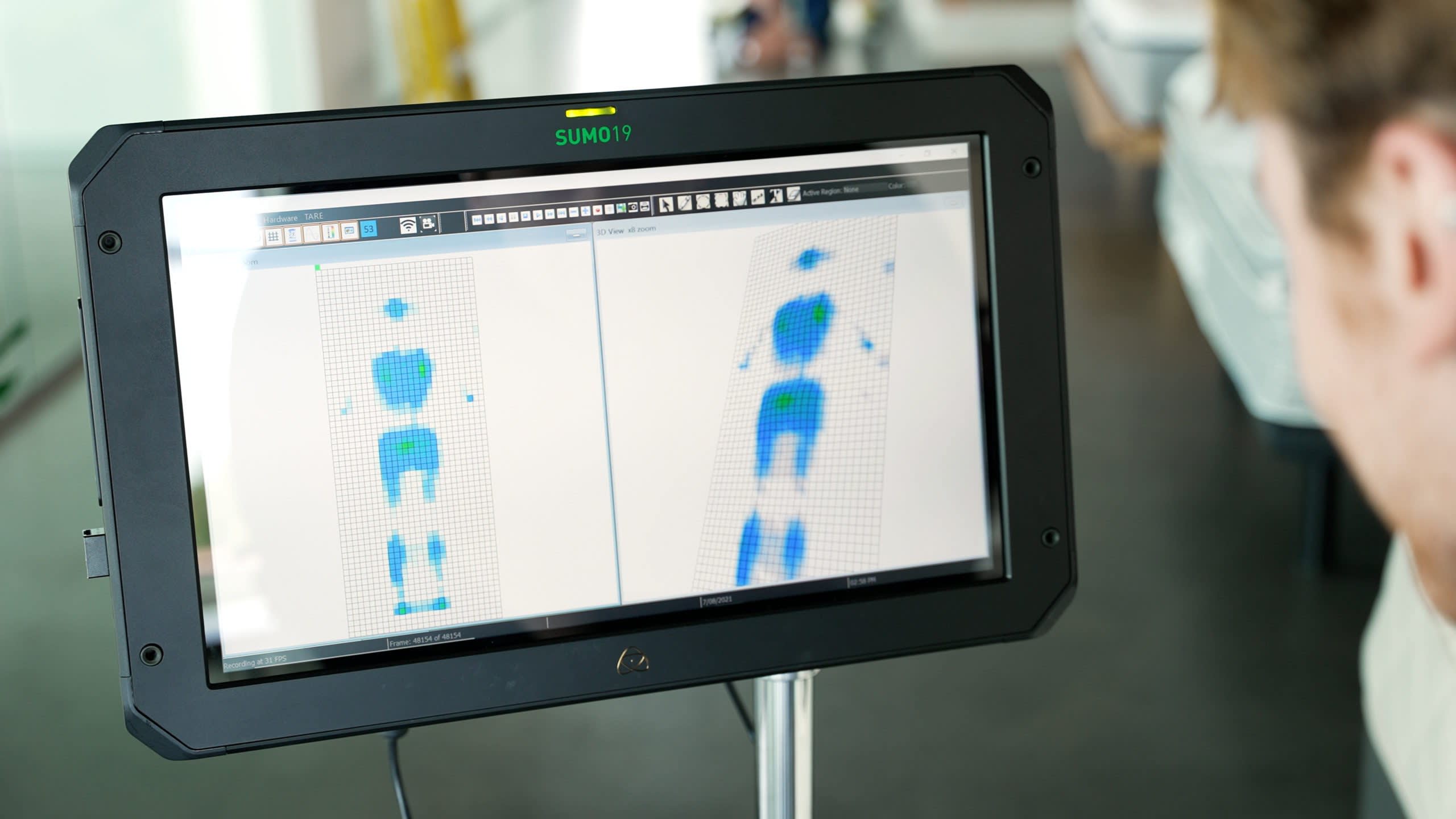
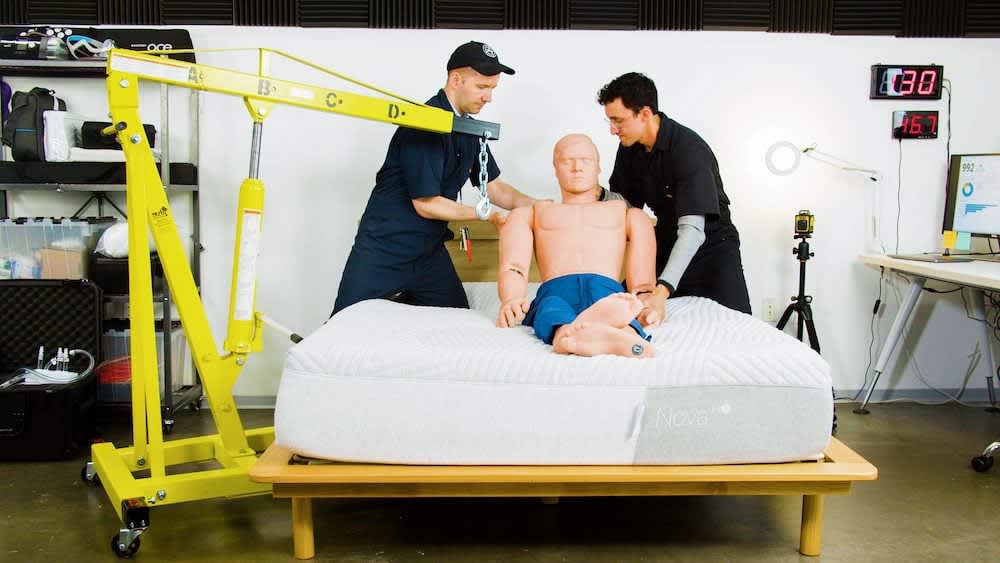
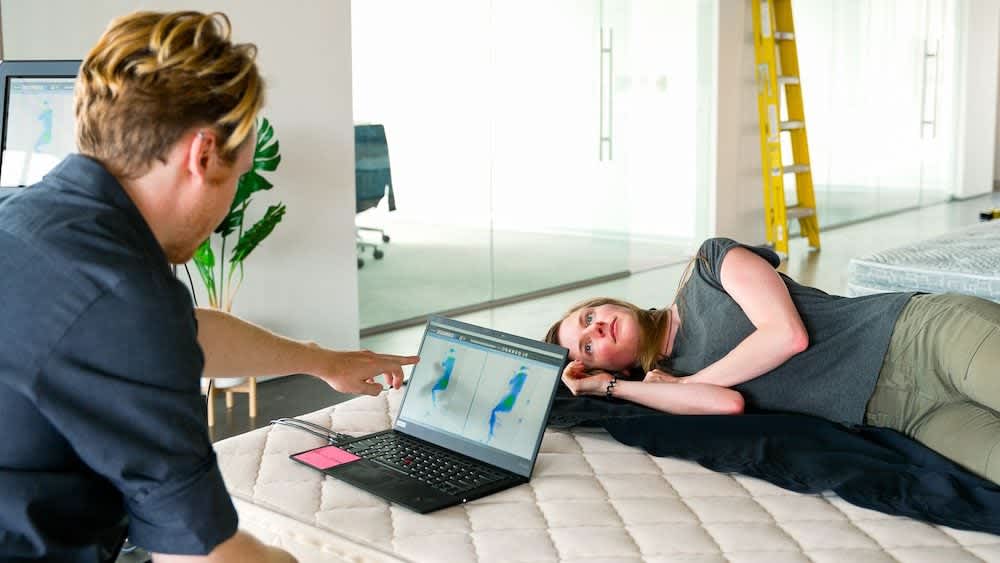
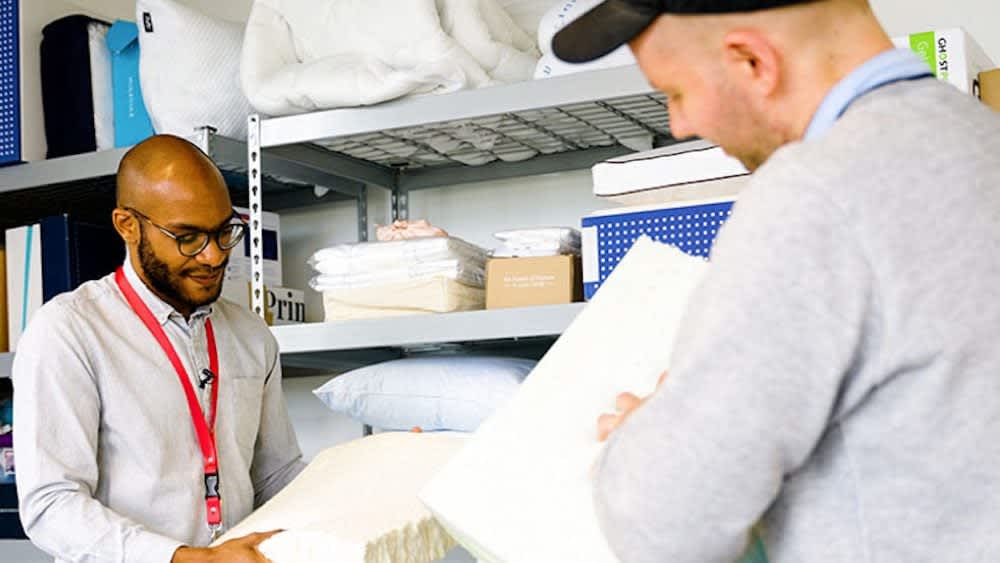
More Mattress Guides
Still haven’t found your perfect mattress? For more help deciding which mattress is right for your specific needs, check out the guides below.
Best Mattress by Sleeper Type
Frequently Asked Questions
Do mattresses have a weight limit?
It varies, but most mattresses have a weight capacity between 500 and 700 pounds for a queen or king size. Other models are built to have higher weight capacities for heavier sleepers. I’ve found that some manufacturers list this information on their websites, but for many mattress companies, you have to email them or use their online chat service to get a specific number.
What is a bariatric mattress and who is it best for?
A bariatric mattress is specifically designed for heavier people with medical needs. These mattresses tend to be firmer, with a more robust and heavy-duty build. Most bariatric mattresses support between 600 and 1,000 pounds.
Some medical equipment distributors require a prescription for bariatric mattresses, while select retailers sell them without a prescription. If your doctor prescribes a bariatric mattress, insurance may cover some or all of the cost.
Do heavier people need to replace their mattress more often?
It depends on the quality of the mattress, but in general, yes, mattresses can wear out faster under higher weight. More body weight means more pressure on the materials, which can lead to sagging or loss of support sooner than the typical 7- to 10-year lifespan often advertised by manufacturers.
I recommend choosing a well-built mattress with high-density foams, sturdy coils, or reinforced support zones to help extend its durability. Keep an eye out for signs like sagging, lumps, or waking up sore — these are clues that your mattress may no longer be doing its job.
Are tall/thick mattresses better for heavy people
Not inherently, but they certainly can be. It really depends on what materials in the mattress are making it thick. A thick pocketed coil support core or high density foams will add more support to a mattress. But if there’s a thick, soft memory foam layer on the surface, that can cause sinkage and ease of movement problems for a heavy sleeper. Make sure to understand where that thickness is coming from, because it could go either way.
What is the best way for a heavy person to sleep
As a general rule, experts recommend side sleeping as the healthiest sleeping position. This is because it keeps your airways in your throat open, allowing for better sleep and preventing sleep apnea, which is a particular concern for heavier people. If you are a back sleeper, you can use pillows or an adjustable bed to pop up your head into a reclined position, improving airflow. Regular back and stomach sleeping tend to leave heavier sleepers at the highest risk for snoring and sleep apnea.

Still have questions? Ask our community!
Join our Sleep Care Community — a trusted hub of product specialists, sleep health professionals, and people just like you. Whether you’re searching for the perfect mattress or need expert sleep advice, we’ve got you covered. Get personalized guidance from the experts who know sleep best.

